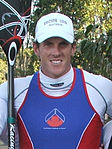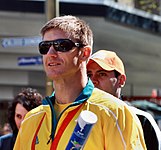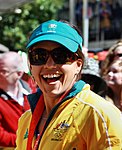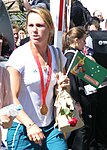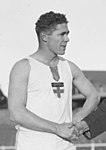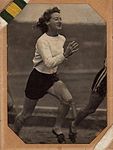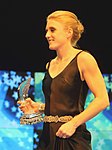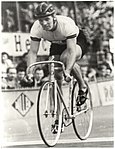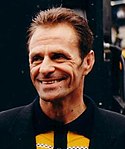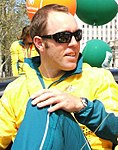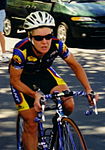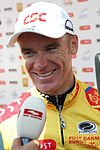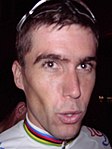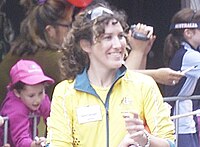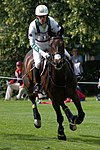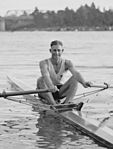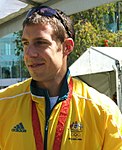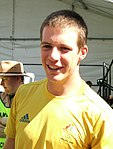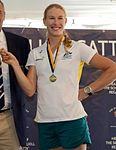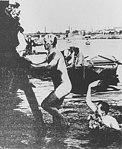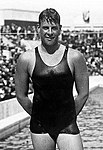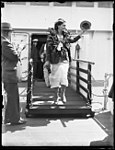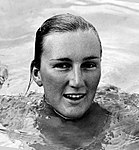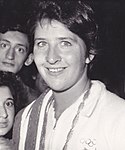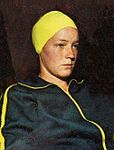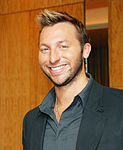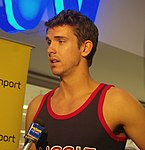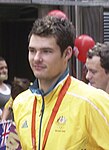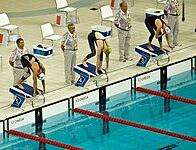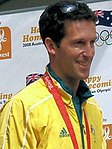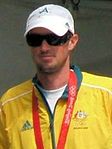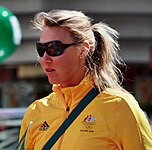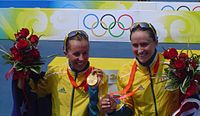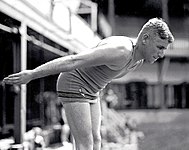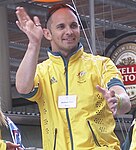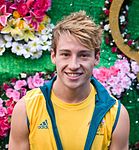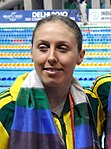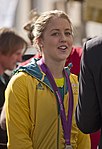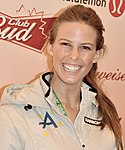Olympic history of Australia
|
|
|
|
|---|---|---|
| 152 | 170 | 193 |
Australia , whose NOK , the Australian Olympic Committee , was founded in 1895, took part in all the summer games, with Australian and New Zealand athletes competing together under the name Australasia in1908 and 1912. Australia was first represented at the Winter Games in 1936 and has been participating since 1952. Australia has sent young athletes to all of the Youth Olympic Games so far.
General
Australia has been participating in the Olympic Games since the first modern Olympic Games in Athens in 1896. Australia's first Olympian was Edwin Flack , who competed in both athletics and tennis. With his victories over 800 and 1500 meters, Flack became the first Olympic champion in Australia. The first woman to appear at the Olympic Games in 1920 was Lily Beaurepaire, who competed in swimming and diving. The first woman in Australia to win an Olympic medal was swimmer Bonnie Mealing , who won silver over 100 meters in 1932. Two days later, Clare Dennis became the first woman from Australia to become an Olympic champion with her victory in the 200 meter chest.
Since 1936, with the exception of 1948, Australia took part in all subsequent Winter Games. The first winter Olympian was the speed skater Kenneth Kennedy in 1936 . The first women at the Winter Games in 1952 were figure skaters Nancy Burley and Gweneth Molony. The first medal at the Winter Games, a bronze medal, was won by the men's relay in the short track in 1994. The first medal in an individual sport in winter was won by ski racer Zali Steggall in slalom. Short tracker Steven Bradbury , who won gold over 1000 meters in 2002 , achieved his first Olympic win at the Winter Games . The first Olympic champion at the Winter Games was the freestyler Alisa Camplin two days later , who won the jumping.
In 1908 and 1912 Australian athletes took part as members of the Australasiens team, an association of athletes from Australia and New Zealand .
The most successful sport at the Olympic Games is swimming. 191 medals could be won here. There are eight swimmers among the ten most successful Australian Olympians. With five Olympic victories, three silver and one bronze medal, the swimmer Ian Thorpe is the most successful participant in Australia. The most successful woman with four gold and four silver medals is the swimmer Dawn Fraser .
Australia's first Olympic team included one participant in 1896. At the domestic summer games in Melbourne in 1956, 298 athletes started, the first time a number of participants in the three-digit range. Four of these athletes were riders who took part in the equestrian games in Stockholm. The largest team in Australia started in Sydney in 2000. 617 athletes took part here. The largest Olympic team outside Australia had 470 participants in Athens in 2004.
The most Olympic athlete was eventing rider Andrew Hoy . Between 1984 and 2004 and again in 2012, Hoy competed in seven Olympic Games. He was three times Olympic champion and also won another bronze medal.
The most successful games in terms of medals won was in Sydney in 2000. 58 medals were won here, 16 gold, 25 silver and 17 bronze medals. In terms of the number of Olympic victories, participation in Turin in 2004 was even more successful. 17 gold medals were won here. The most successful winter games were the 2010 games in Vancouver with two Olympic victories and one silver medal.
Applications and hosting of the Olympic Games
Applications
Three applications were submitted for the Summer Olympics. Melbourne applied to host the 16th Olympic Games in 1956 and was awarded the contract at the 43rd IOC session in Rome . Melbourne prevailed in the fourth ballot with one vote ahead of Buenos Aires . Melbourne also applied to host the 26th Olympic Games in 1996, but was eliminated in the third round of voting at the 96th IOC session in Tokyo . Sydney then applied to host the 27th Olympic Games in 2000. At the 101st IOC session, Sydney prevailed against Beijing in the fourth ballot .
So far, no Australian community has applied to host the Winter Olympics.
Alignment
The first Olympic Games on Australian soil were the 1956 Summer Games in Melbourne. They took place in Melbourne from November 22 to December 8, 1956. Because of the strict quarantine regulations for horses, the equestrian competitions had to be held in Stockholm from July 10th to 17th, 1956 . A total of 3314 athletes, 376 of them women, from 72 countries took part. The Olympic flame was lit by the athlete Ron Clarke , the Olympic oath was taken by the middle-distance runner John Landy .
Sydney hosted the 2000 Summer Games. They took place from September 15 to October 1, 2000. 10,651 athletes, 4069 of them women, from 199 countries started. The Olympic flame was lit by the athlete Cathy Freeman . The hockey player Rechelle Hawkes took the Olympic oath for the active players and the water polo referee Peter Kerr took the oath for the judges.
IOC members
Australia has two active IOC members and two honorary members. In 2001 the lawyer John Coates was elected an IOC member. In 2013 he was followed by three-time Olympic rowing champion James Tomkins , who had been elected to the IOC's athletes' commission a year earlier.
In 1977 sprinter Kevan Gosper was elected an IOC member. His membership ended in 2013 and has been an honorary member since 2014. Canoeist Phillip Coles was elected an IOC member in 1982. In 2012 membership ended, after which he became an honorary member.
Overview of the participations
Summer games
| year | Athletes | Flag bearer | Medals | ||||||
|---|---|---|---|---|---|---|---|---|---|
| total |
|
|
|
|
|
total | rank | ||
| 1896 | 1 | 1 | 0 | 2 | 2 | 8th | |||
| 1900 | 2 | 2 | 0 | 2 | 3 | 5 | 9 | ||
| 1904 | 2 | 2 | 0 | ||||||
| 1908-1912 | Participation as members of the Australasian team | ||||||||
| 1920 | 13 | 12 | 1 | George Parker | 2 | 1 | 3 | 16 | |
| 1924 | 35 | 35 | 0 | Edwin Carr | 3 | 1 | 2 | 6th | 11 |
| 1928 | 18th | 14th | 4th | Henry Pearce | 1 | 2 | 1 | 4th | 19th |
| 1932 | 12 | 8th | 4th | Andrew Charlton | 3 | 1 | 1 | 5 | 10 |
| 1936 | 32 | 28 | 4th | Duncan Gray | 1 | 1 | 30th | ||
| 1948 | 75 | 66 | 9 | Les McKay | 2 | 6th | 5 | 13 | 14th |
| 1952 | 81 | 71 | 10 | Mervyn Wood | 6th | 2 | 3 | 11 | 9 |
| 1956 | 298 | 254 | 44 |
Mervyn Wood Albert Jacobs |
13 | 8th | 14th | 35 | 3 |
| 1960 | 189 | 160 | 29 | Jock sturdy skirt | 8th | 8th | 6th | 22nd | 5 |
| 1964 | 243 | 203 | 40 | Ivan Lund | 6th | 2 | 10 | 18th | 8th |
| 1968 | 128 | 104 | 24 | Bill Roycroft | 5 | 7th | 5 | 17th | 9 |
| 1972 | 168 | 139 | 29 | Dennis Green | 8th | 7th | 2 | 17th | 6th |
| 1976 | 180 | 146 | 34 | Raelene Boyle | 1 | 4th | 5 | 32 | |
| 1980 | 120 | 92 | 28 |
Denise Boyd Max Metzker |
2 | 2 | 5 | 9 | 15th |
| 1984 | 242 | 169 | 73 | Wayne Roycroft | 4th | 8th | 12 | 24 | 14th |
| 1988 | 252 | 180 | 72 | Richard Charlesworth | 3 | 6th | 5 | 14th | 15th |
| 1992 | 279 | 187 | 92 | Jennifer Donnet | 7th | 9 | 11 | 27 | 10 |
| 1996 | 417 | 250 | 167 | Andrew Hoy | 9 | 9 | 23 | 41 | 7th |
| 2000 | 617 | 341 | 276 | Andrew Gaze | 16 | 25th | 17th | 58 | 4th |
| 2004 | 470 | 268 | 202 | Colin Beashel | 17th | 16 | 17th | 50 | 4th |
| 2008 | 432 | 233 | 199 | James Tomkins | 14th | 15th | 17th | 46 | 6th |
| 2012 | 404 | 221 | 183 | Lauren Jackson | 8th | 15th | 12 | 35 | 8th |
| 2016 | 420 | 208 | 212 | Anna Meares | 8th | 11 | 10 | 29 | 10 |
Winter games
| year | Athletes | Flag bearer | Medals | ||||||
|---|---|---|---|---|---|---|---|---|---|
| total |
|
|
|
|
|
total | rank | ||
| 1924-1932 | not participated | ||||||||
| 1936 | 1 | 1 | 0 | ||||||
| 1948 | not participated | ||||||||
| 1952 | 9 | 7th | 2 | ||||||
| 1956 | 8th | 7th | 1 | ||||||
| 1960 | 30th | 26th | 4th | Vic Ekberg | |||||
| 1964 | 5 | 3 | 2 | ||||||
| 1968 | 3 | 3 | 0 | Malcolm Milne | |||||
| 1972 | 4th | 4th | 0 | ||||||
| 1976 | 8th | 5 | 3 | Colin Coates | |||||
| 1980 | 9 | 5 | 4th | Robert McIntyre | |||||
| 1984 | 10 | 8th | 2 | Colin Coates | |||||
| 1988 | 19th | 17th | 2 | Michael Richmond | |||||
| 1992 | 22nd | 15th | 7th | Daniel Kah | |||||
| 1994 | 25th | 18th | 7th | Kirstie Marshall | 1 | 1 | 22nd | ||
| 1998 | 23 | 15th | 8th | Richard Nizielski | 1 | 1 | 22nd | ||
| 2002 | 25th | 13 | 12 | Adrian Costa | 2 | 2 | 15th | ||
| 2006 | 40 | 23 | 17th | Alisa Camplin | 1 | 1 | 2 | 17th | |
| 2010 | 40 | 20th | 20th | Torah Bright | 2 | 1 | 3 | 13 | |
| 2014 | 60 | 29 | 31 | Alex Pullin | 2 | 1 | 3 | 24 | |
| 2018 | 50 | 28 | 22nd | Scott James | 2 | 1 | 3 | 23 | |
Interludes
| year | Athletes | Flag bearer | Medals | ||||||
|---|---|---|---|---|---|---|---|---|---|
| total |
|
|
|
|
|
total | rank | ||
| 1906 | 4th | 4th | 0 | 3 | 3 | 19th | |||
Youth Summer Games
| year | Athletes | Flag bearer | Medals | ||||||
|---|---|---|---|---|---|---|---|---|---|
| total |
|
|
|
|
|
total | rank | ||
| 2010 | 100 | 52 | 48 | Elizabeth Parnov | 8th | 13 | 8th | 29 | 6th |
| 2014 | 89 | 43 | 46 | Tiana Penitani | 4th | 3 | 14th | 21st | 14th |
| 2018 | 90 | Keely Small | 4th | 8th | 4th | ||||
Youth Winter Games
| year | Athletes | Flag bearer | Medals | ||||||
|---|---|---|---|---|---|---|---|---|---|
| total |
|
|
|
|
|
total | rank | ||
| 2012 | 14th | 8th | 6th | Greta Small | 2 | 2 | 28 | ||
| 2016 | 17th | 8th | 9 | Emily Arthur | 3 | 1 | 4th | 19th | |
| 2020 | 33 | 15th | 18th | Zoe Michael | |||||
Overview of the sports
Summer games
badminton
|
|
|
|
|---|---|---|
| - | - | - |
Australian athletes have been taking part in badminton tournaments since the introduction of badminton at the 1992 Olympic Games. Anna Lao reached the quarterfinals in singles and together with Rhonda Cator in doubles. It was not until 2012 in London that the Leanne Choo / Renuga Veeran doubles were able to repeat this success.
baseball
|
|
|
|
|---|---|---|
| - | 1 | - |
The first Australian baseball team participated in Atlanta in 1996. The team finished seventh of eight teams. The same result was achieved at the 2000 domestic summer games. In 2004 Australia qualified for the semifinals. Japan were defeated 1-0. In the final, Australia lost to Cuba 2-6, but had won the first Olympic medal in this sport. For the last Olympic baseball tournament in 2008, Australia could not qualify.
| Surname | Games | discipline | annotation |
|---|---|---|---|
| National team | 2004 Athens | first medal win |
basketball
|
|
|
|
|---|---|---|
| - | 3 | 2 |
For the first time an Australian basketball team was represented in Melbourne in 1956 at the Olympic Games. The team reached 12th place in 1964 in Tokyo, the team was ninth, also in 1972 in Munich. In 1976 you could improve to 8th place. This placement was also achieved in Moscow in 1980. In 1984 in Los Angeles, the men finished seventh. For the first time, a women's team also competed. She was fifth out of six teams.
In 1988 in Seoul, both teams were able to advance to the semi-finals. The men won three out of five preliminary round matches and defeated Spain in the quarter-finals. In the semifinals, Australia failed to Yugoslavia. The bronze match against the USA was also lost. The women won two out of three preliminary round matches. They too failed in the semifinals to Yugoslavia. The bronze game was lost against the Soviet Union.
In 1992 the men finished sixth. In Atlanta 1996 there was the biggest success in Australian basketball to date. The men reached the quarter-finals against Croatia after four wins in five preliminary round matches and won the game. In the semi-finals they lost to the USA and then lost the bronze game against Lithuania. The women won three of their five preliminary round matches. Russia was defeated in the quarter-finals and the USA lost in the semi-finals. The women then won the bronze medal with a 66:56 victory over Ukraine.
2000 in Sydney it was enough for the men again only for 4th place. The team won three of the five preliminary round matches and defeated Italy in the quarter-finals. In the semi-finals they lost to France and lost the game for bronze as they did four years earlier against Lithuania. The women won all of their five preliminary round matches. They defeated Poland in the quarter-finals and Brazil in the semi-finals. The final against the USA was lost 54:76.
2004 in Athens, the men could not qualify for the quarter-finals. In the placement games they reached 9th place. The women, however, could repeat their success from Sydney. Again they won all of their five preliminary round matches. They beat New Zealand in the quarterfinals. As in Sydney, they met Brazil in the semi-finals and won 88:75. Again the final opponent was USA, the Australians lost again, this time with 63:74.
The 2008 tournament in Beijing was similar. After three wins in five preliminary round games, they were eliminated in the quarterfinals against the USA. In the final accounts they came in 7th. The women won all five preliminary round matches. They beat the Czech Republic in the quarter-finals and China in the semi-finals. For the third time in a row, the women’s final was USA-Australia, and the US women won for the third time. The result was 65:92.
Also in 2012 in London the men finished seventh again. As in Beijing, they reached the quarter-finals after three preliminary round victories and again the opponent was the US team. Australia lost 86: 119 and was ranked 7th in the final score. The women won four of their five preliminary round matches this time. In the quarter-finals they beat China and this time met the USA in the semi-finals, which defeated the Australians for the fourth time. The bronze match against Russia was won 83:74.
In 2016 in Rio de Janeiro, the men reached the quarter-finals against Lithuania after four preliminary round victories in five games, which they could win. In the semi-finals they lost to Serbia. The bronze match against Spain was also lost with 88:89. The women won all of their five preliminary round matches. In the quarterfinals they lost to Serbia 71:73 and were eliminated. In the final accounts, the team was rated 5th.
| Surname | Games | discipline | annotation |
|---|---|---|---|
| National team of women | 2000 Sydney | Women's tournament | |
| National team of women | 2004 Athens | Women's tournament | |
| National team of women | 2008 Beijing | Women's tournament |
| Surname | Games | discipline | annotation |
|---|---|---|---|
| National team of women | 1996 Atlanta | Women's tournament | first medal win |
| National team of women | 2012 London | Women's tournament |
Beach volleyball
|
|
|
|
|---|---|---|
| 1 | - | 1 |
An Australian medal was won right at the Olympic debut of this sport in Atlanta in 1996. The Natalie Cook / Kerri Pottharst doubles won bronze. Cook / Pottharst became Olympic champions at the 2000 domestic summer games in Sydney. In 2004 in Athens they reached the semi-finals, lost this and also the game for bronze. The male doubles Julien Prosser / Mark Williams performed identically.
In 2008 in Beijing Natalie Cook competed with Tamsin Barnett Hinchley . They were eliminated in the quarterfinals.
| Surname | Games | discipline | annotation |
|---|---|---|---|
|
Natalie Cook Kerri Pottharst |
2000 Sydney | Women's tournament | first Olympic victory |
| Surname | Games | discipline | annotation |
|---|---|---|---|
|
Natalie Cook Kerri Pottharst |
1996 Atlanta | Women's tournament | first medal win |
Archery
|
|
|
|
|---|---|---|
| 1 | - | 2 |
Australian archers competed in the 1972 Olympic re-edition of the sport in Munich. The men's team achieved their first success in Atlanta in 1996 with 4th place. Simon Fairweather won the first Australian medal with his victory in the individual competition in Sydney in 2000 and at the same time achieved the first Australian Olympic victory in this discipline.
In 2004 in Athens Tim Cuddihy won bronze in the singles, the team finished 6th. Another bronze was won in 2016 in Rio de Janeiro by the men's team.
| Surname | Games | discipline | annotation |
|---|---|---|---|
| Simon Fairweather | 2000 Sydney | singles | first medal and Olympic victory |
| Surname | Games | discipline | annotation |
|---|---|---|---|
| Tim Cuddihy | 2004 Athens | singles | |
|
Alec Potts Ryan Tyack Taylor Worth |
2016 Rio de Janeiro | team |
Boxing
|
|
|
|
|---|---|---|
| - | 1 | 3 |
The first Australian boxers competed in Paris in 1924. 1948 in London Adrian Holmes was fourth in the light heavyweight division. Kevin John Hogarth was the first Australian medalist in boxing in Melbourne in 1956. He won bronze in the welterweight division. Two more bronze medals were added in Rome in 1960. Oliver Taylor won his bantamweight medal, while Anthony Madigan won his light heavyweight medal . It wasn't until 32 years later that Grahame Cheney managed to win the next medal. He won silver light welterweight in Soul in 1988.
| Surname | Games | discipline | annotation |
|---|---|---|---|
| Grahame Cheney | 1988 Seoul | Light welterweight |
| Surname | Games | discipline | annotation |
|---|---|---|---|
| Kevin John Hogarth | 1956 Melbourne | Welterweight | first medal win |
| Oliver Taylor | 1960 Rome | Bantamweight | |
| Anthony Madigan | 1960 Rome | Light heavyweight |
fencing
|
|
|
|
|---|---|---|
| - | - | - |
The first Australian fencers took part in the 1952 Olympic fencing tournament in Helsinki. Gregory Benko reached No. 6 in Montreal in 1976 with the foil. This was the only top ranking by an Australian fencer.
Soccer
|
|
|
|
|---|---|---|
| - | - | - |
The first Olympic football tournament with Australian participation took place in 1956. The Australian team reached the quarter-finals, which they lost 4-2 to India. Only in 1988 Australia could qualify again. Again, the team made it to the quarter-finals. Here they lost to the Soviet Union with 0: 3. Australia also reached the quarter-finals in 1992. This time Sweden could be defeated 2-1. In the semifinals there was a 6-1 defeat against Poland. Australia lost the game for bronze 0-1 against Ghana. In 1996 and 2000, the men's teams failed in the preliminary round. In 2000 there was also a women's team for the first time, which, like the men, were eliminated in the preliminary round. They lost 3-0 against the German team.
In 2004 both teams reached the quarter-finals. The men were defeated there by Iraq with 0: 1, the women failed with 1: 2 to Sweden. In 2008, only the men who were eliminated in the preliminary round were there. In 2016, Australia was represented by the women's team. In the quarter-finals, the team held a 0-0 draw against Brazil, which continued even after extra time. The women lost 6-7 on penalties.
Weightlifting
|
|
|
|
|---|---|---|
| 1 | - | 3 |
Australian weightlifters first competed in London in 1948. In 1952, Vern Barberis won the first Australian medal in this sport with bronze in the lightweight.
In 1984, Dean Lukin became the first Australian weightlifting Olympic champion in super heavyweight. Robert Kabbas also won bronze in the light heavyweight division. Stefan Botev , a native Bulgarian who won bronze for his country in 1992, started for his new home in Australia in 1993. In 1996 in Atlanta he won bronze in the super heavyweight division.
| Surname | Games | discipline | annotation |
|---|---|---|---|
| Dean Lukin | 1984 Los Angeles | Super heavyweight | first Olympic victory |
| Surname | Games | discipline | annotation |
|---|---|---|---|
| Vern Barberis | 1952 Helsinki | lightweight | first medal win |
| Robert Kabbas | 1984 Los Angeles | Light heavyweight | |
| Stefan Botev | 1996 Atlanta | Super heavyweight |
golf
|
|
|
|
|---|---|---|
| - | - | - |
Golf was re-included in the Olympic program in Rio de Janeiro in 2016. Two men and two women from Australia competed. Marcus Fraser finished 5th in the men, Minjee Lee 7th in the women.
Handball
|
|
|
|
|---|---|---|
| - | - | - |
Only once, in 2000 in Sydney, Australia took part in the Olympic handball tournament. Both men and women lost all of their preliminary round matches and were eliminated. The women lost u. a. at 10:39 against Austria.
hockey
|
|
|
|
|---|---|---|
| 4th | 3 | 5 |
Australia has been participating in the Olympic hockey tournament since 1956. When they first participated, the Australian men reached 5th place. In 1960 they reached the quarter-finals, in which they failed 0-1 after extra time against India. The first match in the placement round was against Kenya. The game was 1: 1 after regular time. After 40 minutes of extra time and darkness fell, the game was abandoned and Australia declared the winner by tossing a coin. After a protest by the Kenyans, a replay was scheduled, which Australia won 2-1. The game for 5th place, just one day later, against New Zealand they lost 0-1.
The 1964 tournament was more successful and ended with the first medal win by an Australian hockey team. When you were runner-up in the group, you qualified for the semi-finals after the preliminary round. Opponents were India, Australia lost 3-1. The Australians won the game for bronze 3-2 against Spain. In 1968, Australia was tied with Kenya after the preliminary round in second place. To determine the semi-final participant, a playoff had to be played, which Australia won 3-2. In the semifinals, India was beaten 2-1 after extra time. The final against Pakistan was lost 2-1.
In 1972 it was enough for Australia only for the placement games for places 5 to 8. Australia won both games and was fifth. In 1976 the team was second in the group again, this time tied with India. The playoff was won 5: 4 in a seven-meter shootout after a 1: 1 after extra time. In the semifinals, Pakistan was defeated 2-1. The final against New Zealand ended in a 0-1 defeat.
It was not until 1984 that Australia could qualify again. This time a women's team took part for the first time. The men had won all of their five preliminary round matches, u. a. 3-0 against the Federal Republic of Germany. In the semifinals they lost to Pakistan with 0: 1, the game for bronze against the United Kingdom was lost with 2: 3. The women's tournament consisted of six teams, the tournament was played in a final round. Australia lay, u. a. after a 2: 2 against the Federal Republic of Germany, tied with the same goal difference together with the USA in 3rd place. At the time, the regulations did not provide for a direct comparison, which Australia had won 3: 1. Therefore, a seven-meter shootout was ordered immediately after the last game, which the USA could win.
In 1988 the men were able to win all of their five preliminary round games. However, they lost the semi-finals against the United Kingdom (2: 3) and the bronze medal against the Netherlands (1: 2). The women moved into the semi-finals after a victory over Germany (1-0) and two draws. Here they defeated the Netherlands 3-2. In the final, hosts South Korea were the opponents, the preliminary round game ended 5: 5. The Australians won 2-0 and became the first Australian hockey Olympic champions.
In 1992 the men won four of the five preliminary round matches, plus there was a 1-1 draw against Germany. In the semifinals, the Netherlands were defeated 3-0. The final took place against Germany again. Australia lost 1: 2. The women lost to Germany 0: 1 in the preliminary round. One win and one more defeat was only enough for third place in the group and thus for the placement round. The first round against New Zealand was won 5: 1, the game for 5th place against the Netherlands 2: 0.
In 1996 the men's team qualified for the semi-finals. The team finished second in their preliminary group and met Spain in the semifinals. The game was lost with 1: 2. In the game for bronze, the Australians were able to defeat the German team 3-2. The women finished first in the group and were thus directly qualified for the final. In the group games they defeated the German team 1-0. As in 1988, the final was played against South Korea. Australia won 3-1 and was Olympic champion for the second time.
At the domestic summer games in 2000, the men were first in their preliminary group. The semi-final against the Netherlands ended 0-0 after extra time. Australia lost 4-5 in the seven-meter shootout. The Australians won the bronze match against Pakistan 6: 3. The women were also first in their preliminary group. The tournament mode stipulated that the three best in the group played a round of medals. Australia stayed in first place here too and played against Argentina in the final. The Australians won the final 3-1 and became Olympic champions for the second time in a row. For the first time a women's team was able to defend its Olympic victory.
In the 2004 tournament, the men were in second place in their preliminary group. They won the semi-final against Spain 6: 3. In the final against the defeat, it went into overtime after it had been 1: 1 in regular time. Australia won 2-1, making the men Olympic champions for the first time. The women only finished fourth in their preliminary group. They lost against Germany with 1: 2. Thus, the women were only qualified for the placement games for places 5 to 8. Japan were defeated 3-1, in the game for 5th place there was a 3-0 victory against New Zealand.
The men finished 2nd in the preliminary round in 2008. In the semifinals, Spain lost 3-2, but won the bronze match against the Netherlands 6-2. The women only finished third in the group due to the worse goal difference compared to Chine. In the game for 5th place against the United Kingdom, they won 2-0. The same result was achieved in 2012. This time the men came first in the group. In the semifinals they lost to Germany 2-4. The bronze match against the United Kingdom was won 3-1. The women were again third in the group. Again they had a worse goal difference, this time against Argentina and New Zealand. In the preliminary round, the Australians had defeated Germany 3-1. The game for 5th place against China was won 2-0.
The 2016 tournament ended in 6th place for the men. Third in the group, you qualified for the quarter-finals. Here they lost 4-0 to the Netherlands. The women also finished third in the group. They too lost their quarter-finals. There was a 2-4 defeat against New Zealand. The women were also rated in 6th place.
| Surname | Games | discipline | annotation |
|---|---|---|---|
| National team of women | 1988 Seoul | Women's tournament | first Olympic victory |
| National team of women | 1996 Atlanta | Women's tournament | |
| National team of women | 2000 Sydney | Women's tournament | |
| National team of men | 2004 Athens | Men's tournament |
| Surname | Games | discipline | annotation |
|---|---|---|---|
| National team of men | 1968 Mexico City | Men's tournament | |
| National team of men | 1976 Montreal | Men's tournament | |
| National team of men | 1992 Barcelona | Men's tournament |
| Surname | Games | discipline | annotation |
|---|---|---|---|
| National team of men | 1964 Tokyo | Men's tournament | first medal win |
| National team of men | 1996 Atlanta | Men's tournament | |
| National team of men | 2000 Sydney | Men's tournament | |
| National team of men | 2008 Beijing | Men's tournament | |
| National team of men | 2012 London | Men's tournament |
Judo
|
|
|
|
|---|---|---|
| - | - | 2 |
The first Australian judoka started at the Olympic premiere of the sport in 1964. Theodore Boronovskis won the bronze medal in the open class in Tokyo. Only 36 years later, in Sydney in 2000, was another success achieved. Mária Pekli won bronze in the lightweight.
| Surname | Games | discipline | annotation |
|---|---|---|---|
| Theodore Boronovskis | 1964 Tokyo | open class | first medal win |
| Mária Pekli | 2000 Sydney | lightweight |
Canoeing
|
|
|
|
|---|---|---|
| 3 | 8th | 13 |
The first Australian canoeists took part in Melbourne in 1956. Dennis Green and Walter Brown won the bronze medal here in a two-person kayak over 10,000 meters. The next medal win took 24 years to come. In 1980 in Moscow, John Sumegi won silver in a single kayak over 500 meters. He finished fourth over the 1000 meter distance. In 1984 in Los Angeles, Barry Kelly and Grant Kenny won bronze in a two-person kayak over 1000 meters. In this boat class over the same distance, Peter Foster and Kelvin Graham also won bronze in Seoul in 1988. Grant Davies won the silver medal in a single kayak over 1000 meters. The four-person kayak only narrowly failed in fourth place because of a medal rank.
In 1992 in Barcelona an Australian canoeist became the first Olympic champion. Clint Robinson won over 1000 meters in a single kayak. The four-person kayak won bronze. In the women's category, Danielle Woodward took silver in a single kayak on the slalom course. In 1996 three bronze medals could be won. Clint Robinson could not defend his Olympic victory in a single kayak over 1000 meters, he finished third. In a two-person kayak over 500 meters, Daniel James Collins and Andrew Trim came in third. The third bronze medal was won by Katrin Borchert and Annemarie Cox in a two-person kayak over 500 meters. Both women were not born Australians and had previously competed in the Olympic Games for their countries of birth. Cox was Dutch and had won bronze in a two-person kayak in 1988. Borchert was German and won the silver medal in a four-person kayak in 1992.
Borchert was also successful in Sydney in 2000 when she won bronze in a single kayak over 500 meters. Daniel James Collins and Andrew Trim won silver in a two-person kayak over 500 meters. In Athens 2004 Nathan Baggaley won silver in a single kayak over 500 meters. He finished fourth over 1000 meters. Together with Clint Robinson, he also won silver in a two-person kayak over 500 meters. Over 1000 meters, Daniel James Collins and David Rhodes took fourth place. Slalom rider Robin Bell in a single canoe also came fourth .
In 2008 in Beijing, Kenneth Wallace became Olympic champion in a single kayak over 500 meters. He won bronze over 1000 meters. Robin Bell also won bronze in the slalom in the single-canoe. The women's four-person kayak also won bronze. Slalom skier Jacqueline Lawrence won silver in a single kayak. The men's four-man kayak became the 2012 Olympic champion in London. Kenneth Wallace and Dave Smith finished 4th in a two-person kayak over 1000 meters. In the women's category, slalom skier Jessica Fox won silver in a single kayak. Jessica Fox was able to win bronze again in 2016 in Rio de Janeiro. Another bronze medal was won by Kenneth Wallace and Lachlan Tame in a two-person kayak over 1000 meters. Murray Stewart finished fourth in a single kayak over 1000 meters. The men's four-person kayak also took fourth place.
| Surname | Games | discipline | annotation |
|---|---|---|---|
| Clint Robinson | 1992 Barcelona | K 1 1000 meters | first Olympic victory |
| Kenneth Wallace | 2008 Beijing | K 1,500 meters | |
|
Tate Smith Dave Smith Murray Stewart Jacob Clear |
2012 London | K 4 |
| Surname | Games | discipline | annotation |
|---|---|---|---|
| John Sumegi | 1980 Moscow | K 1,500 meters | |
| Grant Davies | 1988 Seoul | K 1 1000 meters | |
| Danielle Woodward | 1992 Barcelona | K 1 slalom | |
|
Daniel James Collins Andrew Trim |
2000 Sydney | K 2,500 meters | |
| Nathan Baggaley | 2004 Athens | K 1,500 meters | |
|
Clint Robinson Nathan Baggaley |
2004 Athens | K 2,500 meters | |
| Jacqueline Lawrence | 2008 Beijing | K 1 slalom | |
| Jessica Fox | 2012 London | K 1 slalom |
| Surname | Games | discipline | annotation |
|---|---|---|---|
|
Dennis Green Walter Brown |
1956 Melbourne | K 2 10,000 meters | first medal win |
|
Barry Kelly Grant Kenny |
1984 Los Angeles | K 2 1000 meters | |
|
Peter Foster Kelvin Graham |
1988 Seoul | K 2 1000 meters | |
|
Kelvin Graham Ian Rowling Steve Wood Ramon Andersson |
1992 Barcelona | K 4 | |
| Clint Robinson | 1996 Atlanta | K 1 1000 meters | |
|
Daniel James Collins Andrew Trim |
1996 Atlanta | K 2,500 meters | |
|
Katrin Borchert Annemarie Cox |
1996 Atlanta | K 2,500 meters | |
| Katrin Borchert | 2000 Sydney | K 1,500 meters | |
| Kenneth Wallace | 2008 Beijing | K 1 1000 meters | |
| Robin Bell | 2008 Beijing | C 1 slalom | |
|
Lisa Oldenhof Hannah Davis Chantal Meek Lyndsie Fogarty |
2008 Beijing | K 4 | |
|
Lachlan Tame Kenneth Wallace |
2016 Rio de Janeiro | K 2 1000 meters | |
| Jessica Fox | 2016 Rio de Janeiro | K 1 slalom |
athletics
|
|
|
|
|---|---|---|
| 21st | 25th | 26th |
An Australian athlete was used when the Olympic Games were first held in Athens in 1896. Edwin Flack became double Olympic champion over 800 and 1500 meters in Athens. This makes him the first Australian Olympic champion and medalist in the country's Olympic history. In 1900 in Paris, Stan Rowley won four medals. In the team run over 5000 meters, he became Olympic champion. However, he ran on a mixed team with runners from the United Kingdom who formed the team of the Amateur Athletic Association . Since Rowley was an Australian member of the British Empire, he was eligible to start for the AAA. He was nominated for the reason to occupy the mandatory fifth starting place. As a sprinter, Rowley was not suitable for the distance of 5000 meters. He had only covered 3500 meters when the penultimate runner crossed the finish line. The jury then broke off the competition. His gold medal is added to the medal balance of the mixed teams. Rowley won three bronze medals in the 60, 100 and 200 meters.
The walker George Parker won silver over 3000 meters in Antwerp in 1920. In 1924 in Paris, Nick Winter was Olympic champion in the triple jump. It was not until 12 years later, in 1936 in Berlin, that an Australian athlete was able to win a medal again. The triple jumper Jack Metcalfe won bronze.
In 1948 in London, the athletes won a total of six medals. John Winter became Olympic champion in the high jump. The long jumper Theo Bruce and the triple jumper George Avery each won silver. With her bronze medal in the 100-meter run, Shirley Strickland de la Hunty became the first Australian woman to win a medal. She also won bronze in the 80 meter hurdles. She was also a member of the 100-meter relay that ran for the silver medal. The women were the medal suppliers in Helsinki in 1952. Marjorie Jackson was a double Olympic champion over 100 and 200 meters. Shirley Strickland de la Hunty won the 80 meter hurdles and took bronze over 100 meters.
76 athletes competed in the 1956 domestic summer games in Melbourne. 12 medals were the result. Betty Cuthbert and Shirley Strickland de la Hunty were the most successful medal collectors. Cuthbert became a three-time Olympic champion. She won gold in the 100 and 200 meters and also won the 100 meter relay. Strickland de la Hunty was Olympic champion in the 80 meter hurdles and was also a member of the gold relay. She won her seventh Olympic medal, making her the most successful Australian athlete to date in terms of the number of medals. Marlene Mathews won two bronze medals in the 100 and 200 meters. Another bronze medal was added by Norma Thrower over 80 meter hurdles. The men's 400-meter relay won silver. Three bronze medals were won in the 100-meter run by Hector Hogan , in the 1500-meter run by John Landy and in the 10,000-meter run by Allan Lawrence .
John Landy (r.) At the finish of the 1500 meter run in 1956, in which he won bronze. The winner Ron Delany from Ireland kneels in front of him
Crossing the finish line in the 1956 women's 100 meter final: Betty Cuthbert in front, Marlene Mathews in the middle, and Heather Armitage from Britain , who was sixth , on the left
In 1960 in Rome, Herb Elliott won the gold medal in the 1,500 meter run. Dave Power won bronze over 10,000 meters, Noel Freeman took silver in the 20 kilometer walk. In the women's race, Brenda Jones won silver over 800 meters. 1964 in Tokyo Betty Cuthbert was once again Olympic champion. This time she won the 400-meter run, Judy Amoore won bronze here. Betty Cuthbert was Olympic champion for the fourth time and was more successful in the number of wins than Shirley Strickland de la Hunty, who had achieved three Olympic victories. Michele Mason won silver in the high jump. Pam Kilborn won bronze in the 80 meter hurdles and Marilyn Black over 200 meters. In the men's race, Ron Clarke took bronze over 10,000 meters.
In Mexico City, Ralph Doubell became Olympic champion over 800 meters. Peter Norman won silver over 200 meters. The award ceremony of this competition caused a sensation. The two Americans Tommie Smith , who won the gold medal, and the bronze medalist John Carlos raised their fists in salute to the Black Power movement. In solidarity, Norman had attached a plaque from the human rights movement Olympics Project for Human Rights to his tracksuit. There was a double victory in the 80 meter hurdles for women. Maureen Caird was Olympic champion ahead of Pam Kilborn . Over 200 meters, Raelene Boyle won silver and Jennifer Lamy bronze. The 1972 Munich Games were a setback for the Australian athletes. Only Raelene Boyle was able to win two silver medals, each over 100 and 200 meters. In 1976 in Montreal none of the 27 participants could climb onto the podium. In 1980 in Moscow, Rick Mitchell won silver over 400 meters.
The first Olympic victory in 16 years was achieved by the heptathlete Glynis Nunn . Gael Martin won bronze in the shot put. Gary Honey achieved the silver medal in the long jump. Honey had exactly the same distance as the Italian Giovanni Evangelisti with 8.24 m . In this case, the second best distance of the athletes had to decide on the placement. Here Honey with 8.18 m was nine centimeters better than Evangelisti with 8.09 m. In 1988 in Seoul, Debbie Flintoff-King won the 400-meter hurdles. Lisa Martin-Ondieki won silver in the marathon. Two bronze medals were the result of the Australian athletes in Barcelona in 1992. Tim Forsyth was third in the high jump, Daniela Costian in the discus throw.
With the largest athletics team since 1956, they traveled to Atlanta in 1996. 60 participants won two silver medals. Cathy Freeman won her medal in the 400-meter run, Louise McPaul in the javelin throw. The team was even bigger at the 2000 domestic summer games in Sydney. 82 participants had to live up to the naturally high expectations of the local audience. One gold and two silver medals were included in the final bill. Cathy Freeman became Olympic champion over 400 meters. Tatiana Grigorieva , a native Russian, won silver in the pole vault. Jai Taurima won the second silver medal in the long jump.
In 2004 in Athens, the members of the men's 400-meter relay ran to the silver medal. The walkers contributed two bronze medals: Nathan Deakes over 20 kilometers in the men and Jane Saville over the same distance in the women. In Beijing 2008 Steve Hooker became Olympic champion in the pole vault. The walker Jared Tallent could win two medals. He won silver over 20 kilometers and bronze over 50 kilometers. Sally Pearson won silver in the 100 meter hurdles. In 2012 in London, Sally Pearson became an Olympic champion. Jared Tallent also became Olympic champion over 50 kilometers after the original winner, Russian Sergei Kirdjapkin, was disqualified for doping. The long jumper Mitchell Watt also won silver. In 2016 in Rio de Janeiro, Jared Tallent won his third medal in a row over 50 kilometers with silver. Dane Bird-Smith won the bronze medal in the competition over 20 kilometers.
Crossing the finish line in the 800 meter final of 1960: Lyudmila Schewzowa from the Soviet Union (left) wins ahead of Brenda Jones
Crossing the finish line in the 10,000 meter final in 1964: Olympic champion Billy Mills from the USA with the 722 and Mohammed Gammoudi from Tunisia with silver with the 615 . Right behind Gammoudi Ron Clarke in 3rd place
The award ceremony in the 200-meter run in 1968: left Peter Norman (silver), center Tommie Smith (gold), right John Carlos (bronze)
Modern pentathlon
|
|
|
|
|---|---|---|
| 1 | - | - |
The first Australian pentathlon competed in Helsinki in 1952. In 1964 in Tokyo, Peter Macken reached 4th place. Australia took 5th place in the team standings. The next successes came 48 years later. In London 2012, Chloe Esposito finished seventh. In 2016 she became an Olympic champion, her brother Max Esposito came in seventh among the men.
| Surname | Games | discipline | annotation |
|---|---|---|---|
| Chloe Esposito | 2016 Rio de Janeiro | first Olympic victory and medal win |
Cycling
|
|
|
|
|---|---|---|
| 14th | 19th | 18th |
Australian cyclists have been participating in Olympic competitions since 1920. In 1928 in Amsterdam, Edgar Gray became Australia's first medalist in cycling. He won bronze in the 1000 meter time trial. In 1932 he became the first cycling Olympic champion from Australia in this discipline. He was also fourth in the sprint. In 1936 in Berlin he reached 5th place in the sprint.
Charles Bazzano finished fourth in the sprint in London in 1948. The pursuit foursome was fifth. Two Olympic victories were won in Helsinki in 1952. Russell Mockridge won the 1000-meter time trial and won the tandem sprint with Lionel Cox . Cox also won silver in the sprint. 1956 in Melbourne there was gold again, this time by Ian Browne and Tony Marchant . Dick Ploog won bronze in the sprint, Warren Scarfe finished fourth in the 1000-meter time trial.
In 1960 in Rome, Ron Baensch reached 4th place in the sprint, Ian Chapman 5th place in the 1000-meter time trial. There were also two fourth places in Tokyo in 1964 by Ray Bilney in the street race and the pursuit foursome. In the individual pursuit, John Bylsma was fourth in Mexico City in 1968. After a 16-year break, medals could be won again in Munich in 1972. Clyde Sefton won silver in the road race, John Nicholson also won silver in the sprint and Danny Clark a third silver medal in the 1000-meter time trial. John Bylsman finished fourth in the individual pursuit for the second year in a row.
28 years after the last Olympic victory in 1984 in Los Angeles, the Australian four-way winner in the team pursuit. Team member Dean Woods finished fourth in the individual pursuit. Woods won silver in the individual pursuit in Seoul in 1988. The track four (with Woods) won bronze in the team pursuit. Martin Vinnicombe took silver in the 1000 meter time trial, Gary Neiwand bronze in the sprint. Gary Neiwand won three silver medals in the sprint, Shane Kelly in the 1000 meter time trial and the track four in the team pursuit. Mark Kingsland finished fourth in the individual pursuit. Kathy Watt became the first Australian woman to win a cycling medal and become an Olympic champion. She won the road race and took silver in the individual pursuit.
In Atlanta 1996 men won three bronze medals by Stuart O'Grady in the points race, Bradley McGee in the individual pursuit and the track four in the team pursuit. Gary Neiwand finished fourth in the sprint. In the women's category, Michelle Ferris won silver in the sprint and Lucy Tyler-Sharman bronze in the points race. Kathy Watt reached fourth place in the time trial. In 2000 in Sydney Brett Aitken and Scott McGrory drove to Olympic victory in the Madison. Shane Kelly won bronze in the 1000 meter time trial, Bradley McGee bronze in the individual pursuit. Gary Neiwand, Sean Eadie and Darryn Hill won bronze in the Olympic sprint. Neiwand also won silver in the Keirin. Michelle Ferris won silver in the women’s 500-meter time trial and fourth in the sprint, as did Anna Millward in the road race.
The 2004 Athens Games were extremely successful. The Australian team achieved six Olympic victories. Olympic champions were the four-wheel in the men's team pursuit, Ryan Bayley in the sprint and keirin, Stuart O'Grady and Graeme Brown in the Madison, Sara Carrigan in the road race and Anna Meares in the 500-meter time trial. Bradley McGee also won silver in the individual pursuit, Shane Kelly bronze in the keirin, Katie Mactier silver in the individual pursuit and Anna Meares bronze in the sprint. Michael Rogers was fourth in the road time trial. The winner, the American Tyler Hamilton , was disqualified for doping. With this, Rogers subsequently advanced to the bronze rank. Shane Kelly also finished fourth in the sprint. Together with Sean Eadie and Ryan Bayley, he also finished fourth in the Olympic sprint. Oenone Wood was fourth in the women's road race.
Anna Meares won silver in the sprint in Beijing in 2008. It would remain the only medal for Australia at these Olympics. Michael Rogers finished fifth in the road race and eighth in the time trial. Cadel Evans finished fifth in the time trial. On his fifth Olympic participation, Shane Kelly finished in both the Keirin and the team sprint. The men's four was also fourth in the team pursuit, as was Cameron Meyer in the points race. Anna Meares was again Olympic champion in the sprint in London in 2012. Together with Kaarle McCulloch , she won bronze in the team sprint. Annette Edmondson won bronze in the Omnium. There was a fourth place in the women's team pursuit. In the men's category, the four-man team pursuit won silver. Sam Willoughby also won silver on BMX. Shane Perkins won bronze in the sprint. The team in the team sprint reached 4th place.
In 2016 in Rio de Janeiro, the four-man won the silver medal in the team pursuit. Anna Meares won bronze in the Keirin. Both team sprint teams took 4th place, also Matthew Glaetzer in the sprint.
| Surname | Games | discipline | annotation |
|---|---|---|---|
| Edgar Gray | 1932 Los Angeles | 1000 meter time trial | first Olympic victory |
| Russell Mockridge | 1952 Helsinki | 1000 meter time trial | |
|
Russell Mockridge Lionel Cox |
1952 Helsinki | tandem | |
|
Ian Browne Tony Marchant |
1956 Melbourne | tandem | |
|
Dean Woods Michael Grenda Kevin Nichols Michael Turtur |
1984 Los Angeles | Team pursuit | |
| Kathy Watt | 1992 Barcelona | Road racing | |
|
Scott McGrory Brett Aitken |
2000 Sydney | Madison | |
| Ryan Bayley | 2004 Athens | sprint | |
| Ryan Bayley | 2004 Athens | Keirin | |
|
Graeme Brown Stuart O'Grady |
2004 Athens | Madison | |
|
Graeme Brown Brett Lancaster Bradley McGee Luke Roberts Peter Dawson Stephen Wooldridge |
2004 Athens | Team pursuit | |
| Sara Carrigan | 2004 Athens | Road racing | |
| Anna Meares | 2004 Athens | 500 meter time trial | |
| Anna Meares | 2012 London | sprint |
| Surname | Games | discipline | annotation |
|---|---|---|---|
| Lionel Cox | 1952 Helsinki | sprint | |
| Clyde Sefton | 1972 Munich | Road racing | |
| John Nicholson | 1972 Munich | sprint | |
| Danny Clark | 1972 Munich | 1000 meter time trial | |
| Dean Woods | 1988 Seoul | Individual tracking | |
| Martin Vinnicombe | 1988 Seoul | 1000 meter time trial | |
| Gary Neiwand | 1992 Barcelona | sprint | |
| Shane Kelly | 1992 Barcelona | 1000 meter time trial | |
|
Brett Aitken Steve McGlede Shaun O'Brien Stuart O'Grady |
1992 Barcelona | Team pursuit | |
| Kathy Watt | 1992 Barcelona | Individual tracking | |
| Michelle Ferris | 1996 Atlanta | sprint | |
| Gary Neiwand | 2000 Sydney | Keirin | |
| Michelle Ferris | 2000 Sydney | 500 meter time trial | |
| Bradley McGee | 2004 Athens | Individual tracking | |
| Katie Mactier | 2004 Athens | Individual tracking | |
| Anna Meares | 2008 Beijing | sprint | |
| Sam Willoughby | 2012 London | BMX | |
|
Jack Bobridge Glenn O'Shea Rohan Dennis Michael Hepburn |
2012 London | Team pursuit | |
|
Jack Bobridge Alexander Edmondson Callum Scotson Michael Hepburn Sam Welsford |
2016 Rio de Janeiro | Team pursuit |
| Surname | Games | discipline | annotation |
|---|---|---|---|
| Edgar Gray | 1928 Amsterdam | 1000 meter time trial | first medal win |
| Dick Ploog | 1956 Melbourne | sprint | |
| Gary Neiwand | 1988 Seoul | sprint | |
|
Dean Woods Brett Dutton Wayne McCarney Steve McGlede Scott McGrory |
1988 Seoul | Team pursuit | |
| Bradley McGee | 1996 Atlanta | Individual tracking | |
| Stuart O'Grady | 1996 Atlanta | Points race | |
|
Brett Aitken Bradley McGee Stuart O'Grady Dean Woods Tim O'Shannessey |
1996 Atlanta | Team pursuit | |
| Lucy Tyler-Sharman | 1996 Atlanta | Points race | |
| Shane Kelly | 2000 Sydney | 1000 meter time trial | |
| Bradley McGee | 2000 Sydney | Individual tracking | |
|
Sean Eadie Darryn Hill Gary Neiwand |
2000 Sydney | Olympic sprint | |
| Michael Rogers | 2004 Athens | Time trial | |
| Shane Kelly | 2004 Athens | Keirin | |
| Anna Meares | 2004 Athens | sprint | |
| Shane Perkins | 2012 London | sprint | |
| Annette Edmondson | 2012 London | Omnium | |
|
Annette Edmondson Melissa Hoskins Josephine Tomic |
2012 London | Team sprint | |
| Anna Meares | 2016 Rio de Janeiro | Keirin |
horse riding
|
|
|
|
|---|---|---|
| 6th | 3 | 3 |
The first Olympic riders in Australia took part in the 1956 Equestrian Games in Stockholm. The strict Australian quarantine regulations for horses were the reason why the equestrian competitions could not be held in Melbourne. The most successful riders were the eventing riders who won all of the Australian medals in equestrianism.
In 1960 in Rome, the eventing riders achieved the Olympic victory with the team. In the individual competition, Lawrence Morgan was Olympic champion, Neale Lavis won silver. In 1964 in Tokyo, show jumper John Fahey was fourth in the individual ranking. In Mexico City in 1968 the eventing riders won bronze in the team classification. In 1972 in Munich they came fourth, in 1976 they won bronze again. Wayne Roycroft reached 5th place in the individual ranking in Montreal, as did the show jumper Guy Creighton.
Only 16 years later, in 1992 in Barcelona, could medals be won again. Matthew Ryan was Olympic champion in the individual and with the team. The team was able to defend their Olympic victory in Atlanta in 1996. In 2000 in Sydney she became Olympic champion for the third time in a row. There was also a silver medal in the individual ranking by Andrew Hoy . In Beijing 2008 a silver medal followed for the team. Megan Jones was fourth in the individual ranking. In 2016 in Rio de Janeiro there was another bronze medal for the team. In London 2012 Andrew Hoy took part in the Olympic Games for the seventh time. In the individual ranking, Sam Griffiths was in 4th place and Christopher Burton in 5th place.
| Surname | Games | discipline | annotation |
|---|---|---|---|
|
Lawrence Morgan on Salad Days |
1960 Rome | Versatility single | first Olympic victory and medal win |
|
Lawrence Morgan on Salad Days Neale Lavis on Mirrabooka Bill Roycroft on Our Solo Brian Crago on Saber |
1960 Rome | Versatility team | |
|
Matthew Ryan on Kibah Tic Toc |
1992 Barcelona | Versatility single | |
|
Matthew Ryan on Kibah Tic Toc Andrew Hoy on Kiwi Gillian Rolton on Peppermint Grove David Green on Duncan II |
1992 Barcelona | Versatility team | |
|
Wendy Schaeffer on Sunburst Andrew Hoy on Darien Powers Gillian Rolton on Peppermint Grove Phillip Dutton on True Blue Girdwood |
1996 Atlanta | Versatility team | |
|
Stuart Tinney on Jeepster Andrew Hoy on Darien Powers Matthew Ryan on Kibah Sandstone Phillip Dutton on House Doctor |
2000 Sydney | Versatility team |
| Surname | Games | discipline | annotation |
|---|---|---|---|
|
Neale Lavis on Mirrabooka |
1960 Rome | Versatility single | |
|
Andrew Hoy on Darien Powers |
2000 Sydney | Versatility single | |
|
Shane Rose on All Luck Sonja Johnson on Ringwould Jaguar Lucinda Fredericks on Headley Britannia Clayton Fredericks on Ben Along Time Megan Jones on Irish Jester |
2008 Beijing | Versatility team |
| Surname | Games | discipline | annotation |
|---|---|---|---|
|
Wayne Roycroft on Zhivago Brien Cobcroft on Depeche Bill Roycroft on Warrathoola James Scanlon on The Furtive |
1968 Mexico City | Versatility team | |
|
Wayne Roycroft on Laurenson Mervyn Bennett on Regal Reign Bill Roycroft on Version Denis Pigott on Hillstead |
1976 Montreal | Versatility team | |
|
Shane Rose on CP Qualified Christopher Burton on Santana II Sam Griffiths on Paulank Brockagh Stuart Tinney on Pluto Mio |
2016 Rio de Janeiro | Versatility team |
Wrestling
|
|
|
|
|---|---|---|
| - | 1 | 2 |
In 1924 in Paris, the first Australian wrestler stepped onto the mat. The first medal was there in 1932 in Los Angeles by the freestyle wrestler Edward Scarf , who won bronze in the light middleweight division. Richard Garrard won silver welterweight in London in 1948, James Michael Armstrong bronze heavyweight.
Although Australian wrestlers took part in all other games in the following years, including in the Greco-Roman style, none of the participants could fight their way onto the podium.
| Surname | Games | discipline | annotation |
|---|---|---|---|
| Richard Garrard | 1948 London | Welterweight freestyle |
| Surname | Games | discipline | annotation |
|---|---|---|---|
| Edward Scarf | 1932 Los Angeles | Light heavyweight freestyle | first medal win |
| James Michael Armstrong | 1948 London | Heavyweight freestyle |
rowing
|
|
|
|
|---|---|---|
| 11 | 15th | 14th |
Australian rowers have taken part in Olympic rowing regattas since 1924. In 1928 in Amsterdam, Henry Pearce became the first Australian medalist and Olympic champion in rowing with his victory in the one. He was able to repeat his Olympic victory in Los Angeles in 1932. Mervyn Wood became Olympic champion in London in 1948. In 1952 in Helsinki he won silver. The eighth took bronze.
At the domestic summer games in Melbourne in 1956, the eighth repeated winning the bronze medal. Mervyn Wood won bronze in double sculls with Murray Riley. Stuart MacKenzie took silver in the single. It wasn't until 1968 that Australian rowers were successful again. The eighth won silver. After this success it took another 16 years until the next medal. In 1984 in Los Angeles, the men's quadruple won silver and the eighth won bronze. For the first time, Australian rowers were able to win a medal. The foursome with the helmsman got bronze. In 1988 in Seoul, Hamish McGlashan reached 4th place in the single.
After 44 years, Australian rowing Olympic champions were crowned for the first time in 1992 in Barcelona. Gold was won by the men's double scull and the four without a helmsman. Two Olympic victories were also achieved in Atlanta in 1996 by the four without a helmsman and the women's double scull. There was also silver for the two without a helmsman and bronze for the men's double scull and both lightweight double sculls. The women's double scull just barely missed a medal rank in fourth place.
At the domestic Summer Games in Sydney in 2000, no Australian boat could go to victory. It was enough for three silver medals through the eighth of the men, the lightweight four without a helmsman and the two without a helmsman. Bronze went to the two and four without helmsmen. The men's double scull and the women's lightweight double scull finished fourth.
The two without a helmsman became Olympic champion in Athens in 2004. James Tomkins won his third gold medal here and was, along with a bronze medal, the most successful Australian rower at the Olympic Games. The lightweight four without a helmsman won silver. Bronze went to the men's eight and the women's double quad. The four without a helmsman and the women's lightweight double scull just missed the medal ranks.
In Beijing both the double scull and the double without a helmsman became Olympic champions. The four without a helmsman won silver. The men's double-fours took 4th place. In London 2012, no boat achieved an Olympic victory. Three silver medals for the four without a helmsman, the double scull for women and the two without a helmswoman and two bronze medals for the double scull for the men and the one for the women stood at the end of the regattas. The lightweight four without a helmsman and the women's double quad finished 4th. Drew Ginn was a rower in the four without a helmsman. With his silver medal, he replaced James Tomkins as the most successful Australian rower at the Olympic Games. Ginn, like Tomkins, had won three gold medals. In addition, Ginn won a silver medal, while Tomkins won a bronze medal.
In 2016 in Rio de Janeiro, Kim Brennan became Olympic champion in single. Brennan started in London in 2012 under her maiden name Crow. The four without a helmsman and the men's double quad both won silver.
| Surname | Games | discipline | annotation |
|---|---|---|---|
| Henry Pearce | 1928 Amsterdam | One | first medal and Olympic victory |
| Henry Pearce | 1932 Los Angeles | One | |
| Mervyn Wood | 1948 London | One | |
|
Stephen Hawkins Peter Antonie |
1992 Barcelona | Double scull | |
|
Andrew Cooper Mike McKay Nicholas Green James Tomkins |
1992 Barcelona | Foursome without a helmsman | |
|
Drew Ginn Mike McKay James Tomkins Nicholas Green |
1996 Atlanta | Foursome without a helmsman | |
|
Megan Still Kate Slatter |
1996 Atlanta | Two without a helmsman | |
|
Drew Ginn James Tomkins |
2004 Athens | Two without a helmsman | |
|
Drew Ginn Duncan Free |
2008 Beijing | Two without a helmsman | |
|
David Crawshay Scott Brennan |
2008 Beijing | Double scull | |
| Kim Brennan | 2016 Rio de Janeiro | One |
| Surname | Games | discipline | annotation |
|---|---|---|---|
| Eighth of the men | 1952 Helsinki | Eighth | |
|
Mervyn Wood Murray Riley |
1956 Melbourne | Double scull | |
| Eighth of the men | 1956 Melbourne | Eighth | |
| Eighth of the men | 1984 Los Angeles | Eighth | |
|
Robyn Gray-Gardner Karen Brancourt Susan Chapman Margot Foster Susan Lee |
1984 Los Angeles | Foursome with a helmsman | |
|
Janusz Hooker Duncan Free Ronald Snook Boden Hanson |
1996 Atlanta | Double fours | |
|
Anthony Edwards Bruce Hick |
1996 Atlanta | Lightweight double scull | |
|
Rebecca Joyce Virginia Lee |
1996 Atlanta | Lightweight double scull | |
|
Matthew Long James Tomkins |
2000 Sydney | Two without a helmsman | |
|
James Stewart Benjamin Dodwell Geoffrey Stewart Boden Hanson |
2000 Sydney | Foursome without a helmsman | |
| Eighth of the men | 2004 Athens | Eighth | |
|
James Stewart Benjamin Dodwell Geoffrey Stewart Boden Hanson |
2004 Athens | Foursome without a helmsman | |
|
Christopher Morgan Karsten Forsterling James McRae Daniel Noonan |
2012 London | Double fours | |
| Kim Crow | 2012 London | One |
Rugby Sevens
|
|
|
|
|---|---|---|
| 1 | - | - |
Rugby Sevens was added to the Olympic program in Rio de Janeiro in 2016. Australia competed with a men's and a women's team. The men were eliminated in the quarter-finals against South Africa with 5:22. In the preliminary round they still won 12: 5. In the placement round they lost to Argentina with 21:26 and France with 10:12 and thus finished eighth and last.
The women started the tournament with two wins, including a 53-0 win over Colombia. This was the biggest win in the tournament. Finally, the Australians played 12:12 against the USA. Spain was beaten 24-0 in the quarter-finals and Canada 17-5 in the semi-finals. In the final there was a duel against New Zealand. The Australians won the match 24:17, becoming the first Olympic champions in rugby sevens.
| Surname | Games | discipline | annotation |
|---|---|---|---|
| National team of women | 2016 Rio de Janeiro | Women's tournament | first Olympic victory and medal win |
shoot
|
|
|
|
|---|---|---|
| 5 | 1 | 5 |
For the first time, Australian shooters took part in an Olympic tournament in London in 1948. A first success could only be recorded in 1984 in Los Angeles. Patricia Dench won bronze with the sport pistol. Eli Ellis and Terry Rumbel took 6th and 7th place in trap shooting. In 1992 in Barcelona, Lynn Freh was seventh with the sport pistol.
1996 in Atlanta there were the first Olympic victories in this sport. First Michael Diamond was Olympic champion in trap shooting, John Maxwell was fourth. Then Russell Mark won the double trap. Deserie Huddleston won bronze in double trap.
In 2000 in Sydney Michael Diamond was able to repeat his Olympic victory, Russell Mark won silver in a double trap. With the air pistol, Annemarie Ford won bronze. In the skeet shooting, Natasha Lonsdale finished fourth. In 2004 in Athens, Suzanne Balogh was Olympic champion in trap shooting, Lauryn Mark was fourth in skeet shooting. Adam Vella won bronze in the men's trap shooting category.
In Beijing 2008 only one bronze medal could be achieved, which Warren Potent achieved with the small bore rifle in prone position. Michael Diamond finished fourth in trap shooting, Russell Mark fifth in double trap. No medal could be won in London in 2012. Michael Diamond finished fourth in trap shooting in his sixth Olympic Games, Suzanne Balogh reached 6th place. In 2016 in Rio de Janeiro, Catherine Skinner was Olympic champion in trap shooting. With four gold and one bronze medal, trap shooting is the most successful discipline for Australia's shooters.
| Surname | Games | discipline | annotation |
|---|---|---|---|
| Michael Diamond | 1996 Atlanta | Trap | first Olympic victory |
| Russell Mark | 1996 Atlanta | Double trap | |
| Michael Diamond | 2000 Sydney | Trap | |
| Suzanne Balogh | 2004 Athens | Trap | |
| Catherine Skinner | 2016 Rio de Janeiro | Trap |
| Surname | Games | discipline | annotation |
|---|---|---|---|
| Russell Mark | 2000 Sydney | Double trap |
| Surname | Games | discipline | annotation |
|---|---|---|---|
| Patricia Dench | 1984 Los Angeles | Sport pistol | first medal win |
| Deserie Huddleston | 1996 Atlanta | Double trap | |
| Annemarie Ford | 2000 Sydney | Air pistol | |
| Adam Vella | 2004 Athens | Trap | |
| Warren Potent | 2008 Beijing | Small caliber rifle lying |
swim
|
|
|
|
|---|---|---|
| 60 | 66 | 65 |
Australia's most successful sport is swimming. Of the ten most successful Olympians, eight are swimmers. In total, Australian swimmers won 188 medals, including 60 gold, 64 silver and 64 bronze medals.
Australia's first Olympic swimmer was in Paris in Frederick Lane in 1900 . He was also Australia's first ever medalist and Olympic champion in swimming. Lane won the 200 meter freestyle and 200 meter obstacle swimming competitions. Francis Gailey won four medals in St. Louis in 1904. He won silver on the freestyle courses over 220, 440 and 880 yards and bronze over one mile freestyle.
In 1920 in Antwerp, the 200-meter freestyle relay won silver. Frank Beaurepaire won bronze in the 1500 meters freestyle. In 1924 in Paris, Andrew Charlton became Olympic champion in the 1500 meter freestyle, Frank Beaurepaire won bronze again. Charlton won bronze in the 400 meter freestyle. Beaurepaire and Charlton were members of the 200-meter freestyle relay that took silver. Charlton won silver in the 400 and 1,500 yards freestyle in 1928. With Edna Davey, who started the 400 meter freestyle, an Australian swimmer took part in the Olympic Games for the first time.
Australia's first female medalist in Olympic swimming, and also the first female Olympic champion, was Clare Dennis in Los Angeles in 1932 , who won the 200-meter chest. Bonnie Mealing won silver over 100 meters chest . In 1936, the participation for Australian swimmers was unsuccessful. In 1948 in London, John Marshall won silver in the 1500 meter freestyle and bronze over 400 meters. Nancy Lyons won silver in the 200 meters chest, Judy-Joy Davies bronze in the 100 meters chest. In Helsinki 1952, John Davies was Olympic champion over 200 meters breast.
Australia celebrated eight Olympic victories at the domestic summer games in Melbourne in 1956. Murray Rose became a three-time Olympic champion. He won the 400 and 1500 meter freestyle and also the men's 200 meter freestyle relay. There was a double success for the men over 100 meters back. David Theile was Olympic champion ahead of John Monckton . Over 100 meters freestyle all medals went to Australia for both men and women. In the men's category, John Henricks won ahead of John Devitt and Gary Chapman, and in the women's category, Dawn Fraser ahead of Lorraine Crapp and Faith Leech . Lorraine Crapp won the 400 meter freestyle ahead of Dawn Fraser. Crapp and Fraser and Leech were members of the 100-meter freestyle relay that won gold.
In 1960 in Rome, swimmers remained successful. Murray Rose won his fourth gold medal in the 400 meter freestyle, while John Konrads won bronze. Konrads became Olympic champion in the 1500 meter freestyle, here Murray Rose won silver. John Devitt won the 100 meters freestyle. Rose, Devitt and Konrads were members of the 200-meter freestyle relay that took bronze. David Theile repeated his Olympic victory over 100 meters back and swam to silver with the 100 meter medley relay. Dawn Fraser was Olympic champion in the 100 meter freestyle. The 100-meter freestyle relay and the 100-meter individual medley relay both won silver. Jan Andrew won bronze over 100 meters dolphin.
In 1964 in Tokyo, Dawn Fraser became the most successful swimmer at the Olympic Games with her fourth gold medal (over 100 meters freestyle) and a silver medal in the 100-meter freestyle relay. In the men's race, Robert Windle won the 1500 meter freestyle, Ian O'Brien the 200 meter chest and Kevin Berry the 200 meter dolphin. Allan Wood swam to two bronze medals in the 400 and 1500 meters freestyle. The men's relay over 100 meters freestyle and 100 meter medley both won bronze.
In Mexico City in 1968 Michael Wenden was a double Olympic champion. He won gold in the 100 and 200 meter freestyle. There was also silver with the 200-meter freestyle relay and bronze with the 100-meter freestyle relay. Greg Brough won bronze in the 1,500 meter freestyle. Lynette McClements became Olympic champion over 100 meters dolphin. She also won silver with the 100-meter individual medley relay. Karen Moras took bronze in the 400 meter freestyle.
In 1972 in Munich, Australian swimmers swam to six Olympic victories. Brad Cooper won the 400 meter freestyle, Shane Gould won the 200 and 400 meter freestyle and 200 meter medley, Beverley Whitfield over the 200 meter chest and Gail Neall over 400 meter medley. There were also silver medals by Graham Windeatt in the 1500 meter freestyle and Shane Gould in the 800 meter freestyle as well as bronze medals by Shane Gould in the 100 meters freestyle and Beverley Whitfield in the 100 meters chest. The participation in Montreal in 1976 was a disappointment for the highly esteemed Australians. Only one bronze medal could be won by Stephen Holland in the 1500 meter freestyle.
With two Olympic victories, the Australian team did better in Moscow in 1980. The men's 100 meter medley relay and Michelle Ford in the 800 meter freestyle were Olympic champions . There were also bronze medals from Graeme Brewer over 200 meters freestyle, Max Metzker over 1500 meters freestyle, Marcus Kerry over 200 meters back, Peter Evans over 100 meters chest and Michelle Ford over 200 meters dolphin. An Olympic victory could be celebrated in Los Angeles in 1984. Jonathan Sieben won over 200 meters dolphin. Silver won Mark Stockwell over 100 meters freestyle, Glenn Beringen over 200 meters chest and the 100-meter freestyle relay of men, Karen Phillips over 200 meters dolphin and Suzanne Landells over 400 meters medley. There were also bronze medals from Justin Lemberg over 400 meters freestyle, Peter Evans over 100 meters chest, Glenn Buchanan over 100 meters dolphin, Robert Woodhouse over 400 meters medley, Michelle Pearson over 200 meters medley and the 100 meter medley relay for men.
In 1988 in Seoul, Duncan Armstrong won gold over the 200 meter freestyle and silver over the 400 meter distance. Julie McDonald won bronze in the 800 meter freestyle. In Barcelona in 1992 Kieren Perkins was Olympic champion in the 1500 meter freestyle before Glen Housman Perkins also won silver in the 400 meter freestyle. Philip Rogers won bronze in the 100 meter chest. In the women's race, Hayley Lewis won silver 800 meters and bronze over 400 meters freestyle. Other bronze medals were won by Nicole Livingstone over 200 meters back, Samantha Riley over 100 meters chest and Susie O'Neill over 200 meters dolphin.
In 1996 in Atlanta, two Olympic victories were celebrated. There was an Australian double victory over 1500 meters freestyle. Defending champion Kieren Perkins won ahead of Daniel Kowalski , who also won bronze in the 200 and 400 meters freestyle. Scott Miller won silver in the 100 meter dolphin, Scott Goodman bronze in the 200 meter dolphin. The men's 100 meter medley relay also won bronze. In the women’s category, Susie O'Neill was Olympic champion over 200 meters dolphin, her teammate Petria Thomas won silver. Samantha Riley repeated her bronze medal over 100 meters chest. The medley relay won silver, the women's 200 meter freestyle relay bronze.
In Sydney 2000, Ian Thorpe was Olympic champion in the 400 meter freestyle, in the 200 meters he won silver. Grant Hackett won gold in the 1500 meter freestyle, here Kieren Perkins won silver. Both men's freestyle relays, each with Ian Thorpe, won gold, the medley relay took silver. Michael Klim also won silver in the 100 meter dolphin with Geoff Huegill on the bronze rank . Justin Norris won bronze over 200 meters dolphin . Matt Welsh won silver over 100 meters back and bronze over 200 meters back. For women, Susie O'Neill was Olympic champion in the 200 meter freestyle. Over 200 meters dolphin she won silver in front of Petria Thomas on the bronze place. The 200-meter freestyle relay and the layer relay both won silver, as did Leisel Jones over 100 meters chest.
Ian Thorpe was double Olympic champion in the 200 and 400 meters freestyle in Athens in 2004, and he won bronze in the 100 meters. Grant Hackett finished second in the 400m freestyle behind Thorpe and defended his Olympic victory in the 1500m. The men's 200-meter freestyle relay won silver. Thorpe also swam in the season, making him the most successful Australian at the Olympic Games. The women won the 100-meter freestyle relay and the individual relay relay. Petria Thomas became Olympic champion over 100 meters dolphin and won over 200 meters silver. Leisel Jones also won silver in the 200 meter chest, and in 100 meters she was third behind her teammate Brooke Hanson . Jodie Henry won gold in the 100 meters freestyle, Lisbeth Trickett bronze in the 50 meters freestyle.
Six Olympic victories, all by women, were won in Beijing in 2008. In addition to the 200-meter freestyle relay and the individual relay relay, Leisel Jones won gold in the 100 meter chest, Lisbeth Trickett in the 100 meter dolphin and Stephanie Rice in the 200 and 400 meter medley gold. Leisel Jones won silver in the 200 meters chest, Lisbeth Trickett in the 100 meters freestyle. Bronze went to Cate Campbell over 50 meters freestyle, Jessicah Schipper over 100 and 200 meters dolphin and the 100 meter freestyle relay. In the men's race, Grant Hackett won the 1500 meter freestyle, Eamon Sullivan the 100 meter freestyle, Brenton Rickard the 200 meter chest and the individual medley silver. Bronze won both freestyle seasons as well as Hayden Stoeckel over 100 meters back and Andrew Lauterstein over 100 meters dolphin.
Participation in London in 2012 turned out to be less successful despite the victory in the women's 100-meter freestyle relay. The men won two silver medals through James Magnussen over 100 meters freestyle and Christian Sprenger over 100 meters chest. The men's medley relay won bronze. In addition to the Olympic victory in the relay, the women won silver through the 200-meter freestyle relay and the single layer relay. Emily Seebohm also won silver in the 100 meters back and Alicia Coutts in the 200 meters medley. Bronze went to Bronte Barratt in the 200 meters freestyle and Alicia Coutts in the 100 meters dolphin.
The men were able to celebrate Olympic victories again in Rio de Janeiro in 2016. Kyle Chalmers was Olympic champion in the 100 meter freestyle, Mackenzie Horton in the 400 meter freestyle. Mitch Larkin won silver over 200 meters back. The 100-meter freestyle relay and the men's individual relay relay both won bronze. For women, the 100-meter freestyle relay was able to repeat its Olympic victory. The 200-meter freestyle relay and the individual medley relay won silver. There was also a silver medal from Madeline Groves over 200 meters dolphin and a bronze medal from Emma McKeon over 200 meters freestyle.
sailing
|
|
|
|
|---|---|---|
| 11 | 8th | 8th |
The first Olympic sailing regattas with Australian participation were the regattas in 1948. The first medals were won at the domestic summer games in 1956. In the Sharpie class, John Scott and Rolly Tasker won the silver medal. The 5.5 m class boat won bronze. In 1960 Ronald Jenyns reached fourth place in the Finn dinghy.
The first Olympic victory was achieved in 1964 with victory in the 5.5 m class. In 1968 Ronald Jenyns repeated his fourth place in the Finn dinghy. The Australian Flying Dutchman also finished fourth. Two Olympic victories were achieved in 1972 by boats in the Starboat and Dragon classes. Curiously, the twin brothers John and Thomas Anderson won their gold medals in two different boat classes, John in the star boat, Thomas in the kite. In addition, John Bertrand placed fourth in the Finn dinghy .
In 1976 John Bertrand was able to win a bronze medal in the Finn dinghy. Another bronze medal went to the 470 class boat. The Tornado class boat took fourth place. In 1984 the Tornado class boat won bronze. The Finn Dinghi class silver medalist, American John Bertrand, was not related to the 1976 bronze medalist.
In 1992 Lars Kleppich won bronze in windsurfing. Bronze also went to the Tornado class boat. In 1996 the Tornado boat won silver and the Star boat class won bronze. Michael Blackburn finished 4th in the Finn dinghy. At the 2000 domestic summer games, there were two Olympic victories to celebrate. The men's and women's 470 class boats were Olympic champions and were able to win the first medals for female sailors from Australia. The Tornado class boat also won silver, Michael Blackburn won bronze in the Finn dinghy. Lars Kleppich finished fourth in windsurfing.
In 2004 Sarah Blanck finished fourth in the Europe class. In 2008, as in 2000, both 470 boats won the gold medal. The Tornado class boat won silver. Sarah Blanck repeated her fourth place in the Europe class. With three Olympic victories and one silver medal, the 2012 Games turned out to be the most successful participation by Australian sailors. Olympic victories were achieved by the men's 470 and 49er class boats and Tom Slingsby in the laser. The Elliott class sailors won silver. Tom Burton became Olympic champion in the laser in 2016. Silver went to the men's 470 and 49 class boats, as well as the Nacra 17.
| Surname | Games | discipline | annotation |
|---|---|---|---|
|
Bill Northam Peter O'Donnell James Sargeant |
1964 Tokyo | 5.5 m | first Olympic victory |
|
David Forbes John Anderson |
1972 Munich | Star boat | |
|
John Cuneo John Shaw Thomas Anderson |
1972 Munich | Dragons | |
|
Tom King Mark Turnbull |
2000 Sydney | 470s | |
|
Jenny Armstrong Belinda Stowell |
2000 Sydney | 470s | |
|
Nathan Wilmot Malcolm Page |
2008 Beijing | 470s | |
|
Elise Rechichi Tessa Parkinson |
2008 Beijing | 470s | |
| Tom Slingsby | 2012 London | laser | |
|
Mathew Belcher Malcolm Page |
2012 London | 470s | |
|
Nathan Outteridge Iain Jensen |
2012 London | 49er | |
| Tom Burton | 2016 Rio de Janeiro | laser |
| Surname | Games | discipline | annotation |
|---|---|---|---|
|
John Scott Rolly Tasker |
1956 Melbourne | Sharpie | first medal win together with the boat of the 5.5 m class |
|
Mitch Booth Andrew Landenberger |
1996 Atlanta | tornado | |
|
Darren Bundock John Forbes |
2000 Sydney | tornado | |
|
Darren Bundock Glenn Ashby |
2008 Beijing | tornado | |
|
Olivia Price Nina Curtis Lucinda Whitty |
2012 London | Elliott | |
|
Mathew Belcher William Ryan |
2016 Rio de Janeiro | 470s | |
|
Nathan Outteridge Iain Jensen |
2016 Rio de Janeiro | 49er | |
|
Jason Waterhouse Lisa Darmanin |
2016 Rio de Janeiro | Nacra 17 |
| Surname | Games | discipline | annotation |
|---|---|---|---|
|
Douglas Buxton Devereaux Mytton Jock Sturrock |
1956 Melbourne | 5.5 m | first medal win together with the Sharpie class boat |
| John Bertrand | 1976 Montreal | Finn dinghy | |
|
Ian Brown Ian Ruff |
1976 Montreal | 470s | |
|
Christopher Cairns Scott Anderson |
1984 Los Angeles | tornado | |
| Lars Kleppich | 1992 Barcelona | Windsurfing | |
|
Mitch Booth John Forbes |
1992 Barcelona | tornado | |
|
Colin Beashel David Giles |
1996 Atlanta | Star boat | |
| Michael Blackburn | 2000 Sydney | Finn dinghy |
Softball
|
|
|
|
|---|---|---|
| - | 1 | 3 |
Softball was included in the 1996 Olympic program. When this competition was held for the first time, the Australian team won the bronze medal. The women won six out of nine games. Also in Sydney in 2000 the team reached bronze. She won six of the seven preliminary round matches. The following round was played in the page playoff system . First Australia lost 1-0 to Japan. Since China lost 3-0 to the USA, Australia then played the final against the USA, but lost 1-0, leaving the Australians bronze.
In 2004 in Athens, Australia won silver. Six of the seven preliminary round matches were won. In the second semi-final they lost against the USA with 0: 5, but could in Final Japan 3: 0 beat and the Grand Final move. Here they lost again to the USA, this time with 1: 5. In 2008 in Beijing, the Australians won their fourth and final bronze medal. They won five times in seven preliminary round matches. The semi-final against Canada was won 5-3, but the final against Japan was lost 3-4.
| Surname | Games | discipline | annotation |
|---|---|---|---|
| National softball team | 2004 Athens |
| Surname | Games | discipline | annotation |
|---|---|---|---|
| National softball team | 1996 Athens | first medal win | |
| National softball team | 2000 Sydney | ||
| National softball team | 2008 Beijing |
Taekwondo
|
|
|
|
|---|---|---|
| 1 | 1 | - |
At the Olympic premiere of the sport in Sydney in 2000, Australian Taekwondoin won their first medals. The first medal, at the same time the first Olympic victory, won Lauren Burns in the flyweight division. Daniel Trenton won silver in the heavyweight division. In the following years, however, Australian athletes remained unsuccessful.
| Surname | Games | discipline | annotation |
|---|---|---|---|
| Lauren Burns | 2000 Sydney | Flyweight | first medal and Olympic victory |
| Surname | Games | discipline | annotation |
|---|---|---|---|
| Daniel Trenton | 2000 Sydney | Heavyweight |
tennis
|
|
|
|
|---|---|---|
| 1 | 1 | 3 |
As early as 1896 in Athens, an Australian, Edwin Flack , took part in the Olympic tennis tournament. In doubles he won the bronze medal, but this medal is not listed in the Australian medal balance because Flack's doubles partner was the Briton John Pius Boland , who thus formed a mixed team.
In 1988 tennis was reinstated in the Olympic program. The women's doubles Elizabeth Smylie and Wendy Turnbull were the first Australian medal winners in tennis with bronze. The doubles Rachel McQuillan and Nicole Provis also won bronze in 1992 in Barcelona.
In 1996, Todd Woodbridge and Mark Woodforde achieved their first Australian Olympic tennis victory in doubles by defeating British doubles Neil Broad and Tim Henman . In 2000 in Sydney they lost to the Canadians Sébastien Lareau and Daniel Nestor in the final . In the women's singles, Jelena Dokić could not win her game for the bronze medal against the American Monica Seles . In 2004 in Athens Alicia Molik won bronze by defeating the Russian Anastassija Myskina .
| Surname | Games | discipline | annotation |
|---|---|---|---|
|
Todd Woodbridge Mark Woodforde |
1996 Atlanta | Double | first Olympic victory |
| Surname | Games | discipline | annotation |
|---|---|---|---|
|
Todd Woodbridge Mark Woodforde |
2000 Sydney | Double |
| Surname | Games | discipline | annotation |
|---|---|---|---|
|
Elizabeth Smylie Wendy Turnbull |
1988 Seoul | Double | first medal win |
|
Rachel McQuillan Nicole Provis |
1992 Barcelona | Double | |
| Alicia Molik | 2004 Athens | singles |
Table tennis
|
|
|
|
|---|---|---|
| - | - | - |
The first Australian table tennis players took part in the 1988 Olympic premiere of the sport in Seoul. The greatest success was the quarter-finals participation of the Miao Miao / Shirley Zhou doubles .
Triathlon
|
|
|
|
|---|---|---|
| 1 | 2 | 2 |
Australian triathletes also took part for the first time at the Olympic premiere of the sport in Sydney in 2000. While Miles Stewart finished sixth in the men's category , all three women achieved a placement in the top 10. With the silver medal, Michellie Jones was Australia's first triathlon medalist. Loretta Harrop finished fifth and Nicole Hackett tenth. In 2004 in Athens, Loretta Harrop won silver, Greg Bennett was fourth.
In 2008 in Beijing, Emma Snowsill became the first Australian Olympic triathlon champion. Today she bears the name Emma Frodeno after she married the German triathlete Jan Frodeno in 2010 , who also became Olympic champion in 2008. Emma Moffatt won the bronze medal. In 2012 in London, Erin Densham won bronze, Emma Jackson finished eighth. In 2016 in Rio de Janeiro, Emma Moffatt finished sixth and Aaron Royle finished ninth.
| Surname | Games | discipline | annotation |
|---|---|---|---|
| Emma Snowsill | 2008 Beijing | first Olympic victory |
| Surname | Games | discipline | annotation |
|---|---|---|---|
| Michellie Jones | 2000 Sydney | first medal win | |
| Loretta Harrop | 2004 Athens |
| Surname | Games | discipline | annotation |
|---|---|---|---|
| Emma Moffatt | 2008 Beijing | ||
| Erin Densham | 2012 London |
do gymnastics
|
|
|
|
|---|---|---|
| - | 1 | - |
Australian gymnasts first took part in the Olympic Games in Melbourne in 1956. It wasn't until 2000 in Sydney that successes were achieved for the first time. In apparatus gymnastics, Lisa Skinner reached place 7 on the floor and place 8 in the individual all-around. The first medal was won in trampoline gymnastics. Ji Wallace won silver in the men's competition. In 2004 in Athens, Allana Slater was eighth on the balance beam. 2008 in Beijing, the women's squad was sixth in the team all-around event. Lauren Mitchell ranked 5th on the floor in London in 2012.
| Surname | Games | discipline | annotation |
|---|---|---|---|
| Ji Wallace | 2000 Sydney | trampoline | first medal win |
volleyball
|
|
|
|
|---|---|---|
| - | - | - |
The first participation of Australian teams in the Olympic volleyball tournament took place in Sydney in 2000. The men's team reached the quarter-finals, but lost 3-1 to Italy. In the placement round they lost to the Netherlands and Cuba and finished eighth. The women were eliminated after the preliminary round. In 2004 in Athens, the men's team was eliminated as the bottom of the group after the preliminary round. The women's team had not been able to qualify for the Olympic tournament.
It wasn't until 2012 in London that an Australian men's team took part again. Again, they were eliminated after the preliminary round.
Water polo
|
|
|
|
|---|---|---|
| 1 | - | 2 |
The first Australian water polo team at the Olympic Games took part in London in 1948. With two defeats in two preliminary round games, Australia was eliminated early. In 1952, the team failed after two defeats in the qualifying round. The tournament at the domestic summer games in 1956 also ended early after three defeats in the preliminary round, as did the tournaments in 1960 and 1964.
Australia could only qualify again in 1972. Here the first point was won with a draw against Greece. Against the team of the Federal Republic of Germany Australia lost 3-6. Four losses in the placement round meant Australia's twelfth place. In 1976 they were eliminated again with three defeats after the preliminary round. There was a 3: 4 defeat against the Federal Republic of Germany.
In 1980 Moscow was more successful. For the first time there was a victory, a 9: 5 over Bulgaria. In the placement round they won again 8: 5 against Bulgaria, 4: 2 against Greece, 9: 4 against Sweden and 5: 4 against Italy. They scored 4: 4 against Romania. With that, Australia finished 7th.
1984 in Los Angeles they qualified for the first time for the final round. After a 6:10 defeat against West Germany, they played 8: 8 against Italy and beat Japan 15: 2. In the final round they lost to Yugoslavia 6: 9 and the USA 7:12. They then defeated the Netherlands 8: 7 and played 10:10 against Spain. In the final standings, Australia finished fifth.
Two wins and three defeats, u. a. an 11:13 against the Federal Republic of Germany, were the preliminary round results from 1988 in Seoul. In the placement round for places 5 to 8 there was a victory over Spain and a defeat against Hungary. In the final accounts, Australia was in 8th place. In 1992, Australia separated from the German team 7: 7 in the preliminary round. With two wins and two defeats they got into the placement round for places 5 to 8. Australia won against Cuba and Hungary and finished 5.
The next participation took place in 2000 in Sydney. This time a women's team was also qualified. With one win and two draws in five preliminary round matches, the men's team went to the quarter-finals. Here they lost 3: 7 against Yugoslavia. In the placement round they lost to Italy and Croatia and finished 8th. The women won four of their five preliminary round matches and thus qualified for the semi-finals. Here Russia was beaten 7: 6. In the final, the women defeated the USA 4-3, making them Australia's first water polo Olympic champion.
The men were only able to qualify for the placement round for places 7 to 12 in Athens in 2004 with just one win and one draw in five preliminary round games. The first placement game against Kazakhstan was won 10-5, the following game against the USA they lost 5-6. The game for place 9 could be won against Croatia with 8: 7. The women managed two wins and one draw in their preliminary round. The semi-final against Greece was lost 6-2. The Australians were also defeated in the game for the bronze medal. They lost 5-6 against the USA.
The 2008 tournament in Beijing was similar for the men to the 2004 tournament. In the preliminary round, two wins and one draw were achieved in five games, but the team only made it to the placement round. After victories over Canada and Italy (after penalty shootout), they lost the game for 7th place against Greece 8: 9. The women reached the semi-final qualification against China with two wins and one draw in three preliminary round matches, which they won 12:11. In the semifinals they lost against the USA 8: 9, but won the game for bronze against Serbia 12:11 after a penalty shootout.
In London 2012, the men qualified for the quarterfinals with two wins in three preliminary round matches. They lost against Serbia with 8:11. In the placement round they then lost to Hungary, but were then able to win the game for 7th place against the USA 10: 9. The women won all three preliminary round matches and faced Russia in the quarter-finals, which they defeated 11:10. In the semifinals they lost 9:11 against the USA, the bronze game was won 13:11 against Hungary.
In 2016 in Rio de Janeiro, the men were eliminated after two wins and one draw in the preliminary round. The women won two of their three preliminary round matches and lost in the quarterfinals to Hungary 11:13. In the placement round Brazil was beaten 11: 4, the game for 5th place against Spain was lost 10:12.
| Surname | Games | discipline | annotation |
|---|---|---|---|
| National women's water polo team | 2000 Sydney | Women's tournament | first medal and Olympic victory |
| Surname | Games | discipline | annotation |
|---|---|---|---|
| National women's water polo team | 2008 Beijing | Women's tournament | |
| National women's water polo team | 2012 London | Women's tournament |
Diving
|
|
|
|
|---|---|---|
| 3 | 3 | 7th |
In 1920 in Antwerp, an Australian diver took part in the Olympic Games for the first time. Richmond Eve became the first Australian Olympic diving champion in Paris in 1924 when he won the diving championship.
It was not until 1964 in Tokyo that another success could be shown. Robyn Bradshaw finished ninth in high diving. Donald Wagstaff reached 8th place in jumping in Mexico City in 1968. In 1980 Valerie McFarlane was sixth in artificial diving and seventh in diving, and in 1984 fifth in the tower. In Barcelona 1992 Michael Murphy just missed a medal with fourth place in jumping. In 1996 in Atlanta he finished sixth.
After 76 years, medals in diving were again won in Sydney in 2000. Robert Newbery and Dean Pullar won bronze in synchronized jumping. With his partner Mathew Helm , Robert Newbery took 5th place in synchronized diving. Dean Pullar was fifth in jumping. Rebecca Gilmore and Loudy Tourky won bronze in synchronized diving. Loudy Tourky finished fourth in synchronized jumping with his partner Chantelle Newbery . Chantelle Newbery took 7th place in artificial jumping.
Australian diving divers were particularly successful in 2004 in Athens. Chantelle Newbery became Olympic champion in high diving, Loudy Tourky won bronze. With her partner, born Russian Irina Laschko , Chantelle Newbery won bronze in synchronized jumping. Loudy Tourky and Lynda Folauhola took 4th place in synchronized diving. In the men's category, Mathew Helm won silver in diving. With Robert Newbery he also won bronze in synchronized diving. Newbery jumped with his partner Steven Barnett to the bronze medal in synchronized jumping.
In 2008 in Beijing, Matthew Mitcham became Olympic champion in high diving, Mathew Helm was sixth. In synchronized diving, Robert Newbery and Mathew Helm reached fourth place. In the women's category , Briony Cole and Melissa Wu won silver in synchronized diving. With her partner Sharleen Stratton , Briony Cole jumped 5th in synchronized jumping. Melissa Wu reached 6th place in diving, Sharleen Stratton 7th place in artificial diving.
A silver medal was won in London in 2012. Brittany Broben achieved this in high diving , Melissa Wu came fourth. Sharleen Stratton took 5th place in artificial jumping and was fifth in synchronized jumping with Anabelle Smith . Loudy Wiggins, who started in 2004 under her maiden name Tourky, and Rachel Bugg finished fourth in synchronized diving. In the men's competition, Ethan Warren was seventh in jumping.
Anabelle Smith and Maddison Keeney won bronze in synchronized jumping in Rio de Janeiro in 2016. In the individual competition, Maddison Keeney was fifth, Esther Qin sixth. Melissa Wu took fifth place in high diving.
| Surname | Games | discipline | annotation |
|---|---|---|---|
| Richmond Eve | 1924 Paris | Diving | first medal and Olympic victory |
| Chantelle Newbery | 2004 Athens | Diving | |
| Matthew Mitcham | 2008 Beijing | Diving |
| Surname | Games | discipline | annotation |
|---|---|---|---|
| Mathew helmet | 2004 Athens | Diving | |
|
Briony Cole Melissa Wu |
2008 Beijing | Synchronized diving | |
| Brittany Broben | 2012 London | Diving |
| Surname | Games | discipline | annotation |
|---|---|---|---|
|
Robert Newbery Dean Pullar |
2000 Sydney | Synchronized jumping | |
|
Rebecca Gilmore Loudy Tourky |
2000 Sydney | Synchronized diving | |
|
Robert Newbery Steven Barnett |
2004 Athens | Synchronized jumping | |
|
Robert Newbery Mathew Helm |
2004 Athens | Synchronized diving | |
| Loudy Tourky | 2004 Athens | Diving | |
|
Chantelle Newbery Irina Laschko |
2004 Athens | Synchronized jumping | |
|
Anabelle Smith Maddison Keeney |
2016 Rio de Janeiro | Synchronized jumping |
Winter games
biathlon
|
|
|
|
|---|---|---|
| - | - | - |
The first Australian biathlete started in Sarajevo in 1984. The greatest success came in 1994 in Lillehammer, when Kerryn Pethybridge-Rim reached 8th place over 15 kilometers.
Bobsleigh
|
|
|
|
|---|---|---|
| - | - | - |
The first Australian bobsleighs were sent to the ice rink in Calgary in 1988. So far there has been no success.
ice Hockey
|
|
|
|
|---|---|---|
| - | - | - |
The first and so far only Australian ice hockey team went on the ice in 1960 in Squaw Valley. In the preliminary round there were two defeats in two games. The three placement games were also lost, so Australia finished ninth and last.
figure skating
|
|
|
|
|---|---|---|
| - | - | - |
The first Australian figure skaters took part in Oslo in 1952.
Speed skating
|
|
|
|
|---|---|---|
| - | - | - |
The first Australian speed skater took part in Garmisch-Partenkirchen in 1936. The Australian Olympic team consisted only of this athlete, Kenneth Kennedy . Colin Hickey had his first success in 1956 in Cortina d'Ampezzo when he finished seventh over 500 and 1500 meters.
In 1976 in Innsbruck Colin Coates ran in 6th place over 10,000 meters and 8th place over 1500 meters. In Calgary 1988, Coates, now 41 years old, took part in the Olympic Winter Games for the sixth time.
Freestyle ski
|
|
|
|
|---|---|---|
| 3 | 3 | 2 |
Freestyle skiing became an Olympic sport in Albertville in 1992. Australian freestylers also competed for the first time at the Olympic debut. In jumping, Kirstie Marshall reached 6th place in Lillehammer in 1994. In 2002 in Salt Lake City, Alisa Camplin became the first Australian woman in jumping to win a gold medal at the Winter Olympics. Lydia Ierodiaconou finished eighth.
In 2006 in Turin Alisa Camplin won another bronze. Jacqui Cooper jumped to 8th place. In the men's category, Dale Begg-Smith was Olympic champion on the moguls. In 2010 in Vancouver, Dale Begg-Smith won silver. Scott Kneller reached 8th place in ski cross. Lydia Lassila, who started in 2002 under her maiden name Ierodiaconou, became Olympic champion in jumping in Vancouver.
In 2014 in Sochi, David Morris won silver in jumping, Lydia Lassila bronze. Laura Peel finished seventh and Danielle Scott ninth. On the moguls, Matt Graham reached 7th place, Britteny Cox 5th place. Katya Crema was seventh in ski cross. In slopestyle, Russell Henshaw reached 8th place and Anna Segal 5th place. In 2018 in Pyeongchang, Rohan Chapman-Davies won silver on the moguls. In the women’s category, Jakara Anthony took 4th place and Britteny Cox 5th place.
| Surname | Games | discipline | annotation |
|---|---|---|---|
| Alisa Camplin | 2002 Salt Lake City | Leap | |
| Dale Begg-Smith | 2006 Turin | Mogul slope | |
| Lydia Lassila | 2010 Vancouver | Leap |
| Surname | Games | discipline | annotation |
|---|---|---|---|
| Dale Begg-Smith | 2010 Vancouver | Mogul slope | |
| David Morris | 2014 Sochi | Leap | |
| Rohan Chapman-Davies | 2018 Pyeongchang | Mogul slope |
| Surname | Games | discipline | annotation |
|---|---|---|---|
| Alisa Camplin | 2006 Turin | Leap | |
| Lydia Lassila | 2014 Sochi | Leap |
Award ceremony 2010: Lydia Lassila (middle) wins gold in jumping ahead of the Chinese Li Nina (l.) And Guo Xinxin (r.)
Nordic combination
|
|
|
|
|---|---|---|
| - | - | - |
In 1960 in the Nordic Combined Squaw Valley there was the first and so far only participation of an Australian athlete.
Sledding
|
|
|
|
|---|---|---|
| - | - | - |
Australian tobogganers first started in Albertville in 1992.
Short track
|
|
|
|
|---|---|---|
| 1 | - | 1 |
The Olympic premiere of this sport took place in 1992 in Albertville. Australian short trackers also took part for the first time. The men's relay won bronze in Lillehammer in 1994, thus ensuring Australia's first ever medal at the Winter Olympics. In 2002, Steven Bradbury became the first Australian Olympic champion at the Winter Games in the 1000-meter run. Bradbury won completely by surprise, because his rivals fell in the final run just before the finish line. Bradbury, who was at the very end, was able to overtake the fallen and cross the finish line first. He was able to finish the semi-finals in second place by falling his opponents and thus qualify for the final.
| Surname | Games | discipline | annotation |
|---|---|---|---|
| Steven Bradbury | 2002 Salt Lake City | 1000 meters | Australia's first ever Olympic victory at the Winter Olympics |
| Surname | Games | discipline | annotation |
|---|---|---|---|
|
Steven Bradbury Kieran Hansen Andrew Murtha Richard Nizielski |
1994 Lillehammer | Season | Australia's first ever medal win at the Winter Olympics |
skeleton
|
|
|
|
|---|---|---|
| - | - | - |
The first Australian skeleton riders started in Turin in 2006.
Alpine skiing
|
|
|
|
|---|---|---|
| - | - | 1 |
Australian ski racers have been taking part in the Winter Olympics since 1952. The greatest success was achieved in 1998 in Nagano Zali Steggall , who won bronze in the slalom. In 2002 in Salt Lake City, Jenny Owens reached 9th place in the alpine combination.
| Surname | Games | discipline | annotation |
|---|---|---|---|
| Zali Steggall | 1998 Nagano | slalom | first medal win |
Cross-country skiing
|
|
|
|
|---|---|---|
| - | - | - |
Australian cross-country skiers have been taking part in the Winter Olympics since 1952.
Snowboard
|
|
|
|
|---|---|---|
| 1 | 2 | 1 |
The first Australian snowboarder started in Nagano in 1998. Torah Bright achieved his first success in 2006 in Turin, finishing fifth in the halfpipe. In 2010 in Vancouver she was then Olympic champion. In 2014 in Sochi, she won a silver medal. In slopestyle she reached number 7.
Two medals were won in 2018. Jarryd Hughes secured the silver medal in snowboard cross , Alex Pullin came in sixth. In the halfpipe, Scott James achieved bronze.
| Surname | Games | discipline | annotation |
|---|---|---|---|
| Torah Bright | 2010 Vancouver | halfpipe | first medal and Olympic victory |
| Surname | Games | discipline | annotation |
|---|---|---|---|
| Torah Bright | 2014 Sochi | halfpipe | |
| Jarryd Hughes | 2018 Pyeongchang | Cross |
| Surname | Games | discipline | annotation |
|---|---|---|---|
| Scott James | 2018 Pyeongchang | halfpipe |
Interludes
Four Australians, three track and field athletes and one swimmer, traveled to the Olympic Intermediate Games in Athens in 1906 . The sprinter Nigel Barker won bronze in the 100 and 400 meters respectively. The swimmer Cecil Healy also won bronze in the 100 meter freestyle.
Youth games
Youth Summer Games
In the first edition of the 2010 Summer Youth Olympic Games in Singapore , 100 young athletes, 52 boys and 48 girls, took part. 29 medals, including eight gold, 13 silver and eight bronze medals, were won.
Olympic champions were the swimmers Nicholas Schafer over 100 meters chest and Emily Selig over 200 meters chest. Both tier seasons won gold. Other Olympic champions include track and field athlete Nicholas Hough, who won the 110 meter hurdles, boxer Damien Hooper, who won the middleweight division, and canoeist Jessica Fox, who won the kayak slalom. The boys' field hockey team also won the gold medal with a 2-1 final victory over Pakistan.
Silver won the mixed 100-meter freestyle relay as well as Kenneth To over 50 meters freestyle and 200 meter medley, Emma McKeon over 100 meters freestyle, Nicholas Schafer over 50 meters chest and Emily Selig over 100 meters chest. Ellie Salthouse won silver in the triathlon, the rowers Emma Basher and Olympia Aldersey in two. Other silver medals were won by the lightweight boxer Brett Mather, the athletes Michelle Jenneke over 100 meter hurdles, Brandon Starc in the high jump and Elizabeth Parnov in the pole vault. The girls' team in 3 × 3 basketball also won silver.
Five bronze medals were won by swimmers: Emma McKeon over 50 and 200 meters freestyle, Nicholas Schafer over 200 meters chest, Max Ackermann over 50 meters back, Kenneth To over 100 meters freestyle and the mixed layer relay. Other bronze medals were won by rowers Matthew Cochran and David Watts in twos and gymnast Angela Donald on the balance beam.
Three other medals were won in mixed teams. These medals do not count towards the Australian medal balance. In the Oceania 1 mixed triathlon relay , Ellie Salthouse won silver. Show jumper Thomas McDermott on Hugo also won silver in the mixed team. Track and field athletes Nicholas Hough and Raheen Williams won bronze in the mixed relay.
In the 2014 Nanjing Youth Olympic Games , 89 youth athletes, 43 boys and 46 girls, took part. This time there were 21 medals, four gold, three silver and 14 bronze medals. The boys' hockey team defended their Olympic victory with a final victory over Canada in the penalty shootout (3: 2) after it had been 3: 3 in regular time. The girls' rugby sevens team, as well as triathlete Brittany Dutton and track and field athlete Jessica Thornton , who won over 400 meters, were also Olympic champions .
The athletes Tay-Leiha Clark won silver in the triple jump and Alex Hulley in the hammer throw as well as the swimmer Ami Matsuo over 50 meters freestyle. The Australian swimming team won nine bronze medals through the individual relay relay for girls and boys, the mixed individual relay relay, the 100-meter freestyle relay for girls and the mixed 100-meter freestyle relay as well as Brianna Throssell over 100 and 200 meters dolphin and 200 yards freestyle and Nicholas Brown over 100 yards dolphin. Further bronze medals were won in athletics by Trae Williams over 100 meters for the boys, Sam Geddes over 100 meters in the girls and Shemaiah James in the high jump as well as in show jumping by Jake Hunter on For the Star in the individual competition and the boxer Caitlin Parker in the heavyweight division .
Five other medals were won in mixed teams. These medals do not count towards the Australian medal balance. Trae Williams became Olympic champion with the mixed 8 x 100 meter relay ( Team 034 ). Rachel Pace started in Team 038 and won silver, Sam Geddes started in Team 017 and won bronze. Judoka Jolan Florimont won bronze with the mixed team Team Xian . The triathletes Brittany Dutton and Jack van Stekelenburg also won bronze in the mixed team Oceania 1 .
Emma McKeon , 2010 Youth Olympic Champion, 2016 Olympic Champion
Youth Winter Games
Fourteen young athletes, eight boys and six girls, took part in the first staging of the 2012 Summer Youth Olympic Games in Innsbruck . Two bronze medals were won.
The medal winners were the snowboarders Alexandra Fitch in slopestyle and Sharnita Crompton, who competed in ice hockey skills.
In 2016 in Lillehammer 17 young athletes, eight boys and nine girls, took part, who won three silver and one bronze medal.
Silver won in snowboarding Emily Arthur in the halfpipe and Alex Dickson in snowboard cross and in freestyle Zali Offord in ski cross. Her teammate Louis Muhlen won bronze in the boys' ski cross.
The short-track runner Julia Moore won the silver medal in the mixed relay. This medal is not included in the Australian medal table.
Art competitions
The composer Ruby Mary Reynolds-Lewis submitted her work Foxhunt to the art competitions as part of the 1924 Olympic Games in Paris , which, however, did not achieve any placement.
In 1932 the painter James Quinn was represented with two of his portraits. One was a portrait of polar explorer Hubert Wilkins , the other a portrait of rowing coach Steve Fairbairn. Both works could not be placed.
Olympic mountaineering award
The Olympic mountaineering award , the Prix olympique d'alpinisme , was awarded in 1924 to the participants of the British Mount Everest expedition of 1922 . One of the participants was the Australian mountaineer George Ingle Finch , who, like the other participants, was personally awarded a gold-plated silver medal by Pierre de Coubertin . The award ceremony took place on February 5, 1924, during the closing ceremony of the Chamonix Winter Games .
Participants by sport
Summer games
| sport | year | |||||||||||||||||||||||||
|---|---|---|---|---|---|---|---|---|---|---|---|---|---|---|---|---|---|---|---|---|---|---|---|---|---|---|
| 1896 | 1900 | 1904 | 1920 | 1924 | 1928 | 1932 | 1936 | 1948 | 1952 | 1956 | 1960 | 1964 | 1968 | 1972 | 1976 | 1980 | 1984 | 1988 | 1992 | 1996 | 2000 | 2004 | 2008 | 2012 | 2016 | |
| badminton | 2 | 8th | 7th | 6th | 6th | 6th | 5 | |||||||||||||||||||
| baseball | 20th | 24 | 24 | |||||||||||||||||||||||
| basketball | 12 | 12 | 12 | 12 | 12 | 24 | 22nd | 12 | 24 | 24 | 24 | 24 | 24 | 24 | ||||||||||||
| Beach volleyball | 6th | 10 | 8th | 4th | 4th | 4th | ||||||||||||||||||||
| Archery | 3 | 4th | 3 | 2 | 3 | 3 | 5 | 6th | 6th | 5 | 2 | 4th | ||||||||||||||
| Boxing | 3 | 3 | 7th | 5 | 9 | 10 | 10 | 4th | 4th | 4th | 2 | 5 | 4th | 6th | 8th | 9 | 9 | 9 | 11 | 3 | ||||||
| fencing | 6th | 21st | 11 | 18th | 5 | 4th | 3 | 3 | 3 | 2 | 2 | 1 | 7th | 3 | 2 | 3 | ||||||||||
| Soccer | 11 | 17th | 19th | 16 | 32 | 32 | 17th | 18th | ||||||||||||||||||
| Weightlifting | 2 | 3 | 7th | 7th | 7th | 2 | 3 | 3 | 5 | 4th | 4th | 4th | 7th | 12 | 2 | 2 | 2 | 2 | ||||||||
| golf | 4th | |||||||||||||||||||||||||
| Handball | 30th | |||||||||||||||||||||||||
| hockey | 18th | 15th | 14th | 14th | 16 | 15th | 32 | 32 | 32 | 32 | 32 | 32 | 33 | 32 | 32 | |||||||||||
| Judo | 4th | 4th | 3 | 3 | 3 | 3 | 2 | 12 | 14th | 12 | 13 | 6th | 7th | |||||||||||||
| Canoeing | 8th | 7th | 10 | 6th | 7th | 8th | 5 | 9 | 8th | 17th | 23 | 21st | 16 | 16 | 20th | 16 | ||||||||||
| athletics | 1 | 1 | 1 | 4th | 9 | 7th | 4th | 5 | 18th | 17th | 76 | 28 | 35 | 24 | 22nd | 27 | 21st | 30th | 28 | 35 | 60 | 82 | 42 | 40 | 50 | 59 |
| Modern pentathlon | 1 | 3 | 3 | 3 | 3 | 2 | 2 | 1 | 3 | 1 | 3 | 1 | 2 | 2 | 1 | 2 | 2 | |||||||||
| Cycling | 2 | 4th | 2 | 1 | 3 | 6th | 6th | 11 | 9 | 14th | 9 | 10 | 12 | 10 | 12 | 17th | 16 | 21st | 27 | 24 | 28 | 27 | 31 | |||
| horse riding | 4th | 7th | 7th | 4th | 7th | 9 | 10 | 5 | 11 | 14th | 8th | 12 | 12 | 12 | ||||||||||||
| Wrestling | 1 | 3 | 1 | 3 | 4th | 4th | 15th | 9 | 8th | 3 | 3 | 3 | 3 | 3 | 3 | 2 | 9 | 11 | 1 | 4th | 1 | 3 | ||||
| rowing | 10 | 1 | 1 | 12 | 8th | 14th | 26th | 25th | 26th | 11 | 16 | 13 | 16 | 25th | 16 | 28 | 45 | 45 | 45 | 48 | 46 | 29 | ||||
| Rugby Sevens | 25th | |||||||||||||||||||||||||
| shoot | 6th | 12 | 7th | 8th | 3 | 4th | 6th | 2 | 9 | 12 | 7th | 16 | 23 | 21st | 17th | 17th | 18th | |||||||||
| swim | 1 | 1 | 6th | 5 | 5 | 5 | 5 | 10 | 10 | 26th | 26th | 32 | 24 | 24 | 28 | 17th | 33 | 27 | 35 | 33 | 52 | 43 | 52 | 55 | 48 | |
| sailing | 3 | 6th | 11 | 11 | 11 | 11 | 13 | 12 | 13 | 13 | 13 | 16 | 18th | 18th | 17th | 13 | 11 | |||||||||
| Softball | 15th | 15th | 15th | 15th | ||||||||||||||||||||||
| Taekwondo | 8th | 4th | 4th | 2 | 4th | |||||||||||||||||||||
| tennis | 1 | 1 | 2 | 6th | 7th | 7th | 10 | 7th | 8th | 6th | 10 | |||||||||||||||
| Table tennis | 3 | 2 | 5 | 9 | 6th | 6th | 6th | 6th | ||||||||||||||||||
| Triathlon | 6th | 6th | 5 | 6th | 6th | |||||||||||||||||||||
| do gymnastics | 9 | 4th | 11 | 2 | 3 | 3 | 3 | 6th | 3 | 7th | 9 | 11 | 9 | 9 | 8th | 4th | ||||||||||
| volleyball | 24 | 12 | 12 | |||||||||||||||||||||||
| Water polo | 10 | 7th | 9 | 10 | 11 | 11 | 11 | 11 | 13 | 13 | 13 | 26th | 26th | 26th | 26th | 26th | ||||||||||
| Diving | 1 | 1 | 1 | 1 | 1 | 2 | 10 | 4th | 2 | 2 | 3 | 4th | 3 | 4th | 5 | 7th | 7th | 6th | 7th | 9 | 10 | 9 | ||||
Winter games
| sport | year | |||||||||||||||||||||||
|---|---|---|---|---|---|---|---|---|---|---|---|---|---|---|---|---|---|---|---|---|---|---|---|---|
| 1936 | 1948 | 1952 | 1956 | 1960 | 1964 | 1968 | 1972 | 1976 | 1980 | 1984 | 1988 | 1992 | 1994 | 1998 | 2002 | 2006 | 2010 | 2014 | 2018 | |||||
| biathlon | 1 | 1 | 2 | 2 | 1 | 1 | 1 | 2 | ||||||||||||||||
| Bobsleigh | 5 | 2 | 4th | 4th | 4th | 7th | 6th | 4th | ||||||||||||||||
| ice Hockey | 17th | |||||||||||||||||||||||
| figure skating | 3 | 2 | 6th | 2 | 2 | 2 | 4th | 3 | 2 | 4th | 2 | 1 | 1 | 4th | 4th | |||||||||
| Speed skating | 1 | 1 | 1 | 2 | 1 | 2 | 1 | 2 | 2 | 4th | 2 | 2 | 1 | 1 | 2 | |||||||||
| Freestyle ski | 2 | 5 | 5 | 7th | 9 | 11 | 21st | 16 | ||||||||||||||||
| Nordic combination | 1 | |||||||||||||||||||||||
| Sledding | 1 | 1 | 1 | 1 | 1 | 1 | ||||||||||||||||||
| Short track | 6th | 5 | 5 | 5 | 6th | 2 | 2 | |||||||||||||||||
| skeleton | 2 | 3 | 3 | 2 | ||||||||||||||||||||
| Alpine skiing | 3 | 5 | 3 | 5 | 1 | 2 | 5 | 4th | 3 | 3 | 2 | 2 | 1 | 10 | 4th | 2 | 5 | 3 | ||||||
| Cross-country skiing | 2 | 1 | 1 | 1 | 2 | 2 | 2 | 2 | 2 | 3 | 3 | 4th | 6th | |||||||||||
| Snowboard | 1 | 1 | 9 | 8th | 11 | 11 | ||||||||||||||||||
Youth Summer Games
| sport | year | |||||||||||||||||||||||||
|---|---|---|---|---|---|---|---|---|---|---|---|---|---|---|---|---|---|---|---|---|---|---|---|---|---|---|
| 2010 | 2014 | |||||||||||||||||||||||||
| badminton | 2 | 2 | ||||||||||||||||||||||||
| basketball | 4th | |||||||||||||||||||||||||
| Beach volleyball | 2 | |||||||||||||||||||||||||
| Archery | 2 | 2 | ||||||||||||||||||||||||
| Boxing | 2 | 2 | ||||||||||||||||||||||||
| fencing | 1 | |||||||||||||||||||||||||
| Weightlifting | 2 | 2 | ||||||||||||||||||||||||
| golf | 2 | |||||||||||||||||||||||||
| Handball | 14th | |||||||||||||||||||||||||
| hockey | 16 | 9 | ||||||||||||||||||||||||
| Judo | 2 | |||||||||||||||||||||||||
| Canoeing | 2 | 1 | ||||||||||||||||||||||||
| athletics | 17th | 20th | ||||||||||||||||||||||||
| Modern pentathlon | 2 | |||||||||||||||||||||||||
| Cycling | 4th | |||||||||||||||||||||||||
| horse riding | 1 | 1 | ||||||||||||||||||||||||
| Wrestling | 3 | 1 | ||||||||||||||||||||||||
| rowing | 4th | 3 | ||||||||||||||||||||||||
| Rugby Sevens | 12 | |||||||||||||||||||||||||
| shoot | 3 | 4th | ||||||||||||||||||||||||
| swim | 8th | 8th | ||||||||||||||||||||||||
| sailing | 2 | 2 | ||||||||||||||||||||||||
| tennis | 4th | |||||||||||||||||||||||||
| Table tennis | 1 | 2 | ||||||||||||||||||||||||
| Triathlon | 2 | 2 | ||||||||||||||||||||||||
| do gymnastics | 9 | 3 | ||||||||||||||||||||||||
| Diving | 1 | |||||||||||||||||||||||||
Youth Winter Games
| sport | year | ||||||||||||||||||||||
|---|---|---|---|---|---|---|---|---|---|---|---|---|---|---|---|---|---|---|---|---|---|---|---|
| 2012 | 2016 | ||||||||||||||||||||||
| biathlon | 1 | 2 | |||||||||||||||||||||
| ice Hockey | 2 | 2 | |||||||||||||||||||||
| figure skating | 1 | ||||||||||||||||||||||
| Freestyle ski | 4th | 4th | |||||||||||||||||||||
| Sledding | 1 | ||||||||||||||||||||||
| Short track | 1 | ||||||||||||||||||||||
| Alpine skiing | 2 | 2 | |||||||||||||||||||||
| Cross-country skiing | 2 | 2 | |||||||||||||||||||||
| Snowboard | 1 | 4th | |||||||||||||||||||||
Medal table
Olympic games
|
|
|
|
total | rank | |
|---|---|---|---|---|---|
| Olympic Summer Games | 147 | 165 | 188 | 500 | 9 |
| winter Olympics | 5 | 5 | 5 | 15th | 20th |
| total | 152 | 170 | 193 | 515 | 11 |
Youth Olympic Games
|
|
|
|
total | rank | |
|---|---|---|---|---|---|
| Youth Olympic Summer Games | 12 | 16 | 22nd | 50 | 9 |
| Youth Olympic Winter Games | 0 | 3 | 3 | 6th | 24 |
| total | 12 | 19th | 25th | 56 | 10 |
Medals by sport
Summer games
| sport | gold | silver | bronze | total |
|---|---|---|---|---|
| swim | 60 | 66 | 65 | 191 |
| athletics | 21st | 26th | 26th | 73 |
| Cycling | 14th | 19th | 18th | 51 |
| rowing | 11 | 15th | 14th | 40 |
| sailing | 11 | 8th | 8th | 27 |
| horse riding | 6th | 3 | 3 | 12 |
| shoot | 5 | 1 | 5 | 11 |
| hockey | 4th | 3 | 5 | 12 |
| Canoeing | 3 | 8th | 13 | 24 |
| Diving | 3 | 3 | 7th | 13 |
| Triathlon | 1 | 2 | 2 | 5 |
| tennis | 1 | 1 | 3 | 5 |
| Weightlifting | 1 | 1 | 2 | 4th |
| Taekwondo | 1 | 1 | 0 | 2 |
| Archery | 1 | 0 | 2 | 3 |
| Water polo | 1 | 0 | 2 | 3 |
| Beach volleyball | 1 | 0 | 1 | 2 |
| Modern pentathlon | 1 | 0 | 0 | 1 |
| Rugby Sevens | 1 | 0 | 0 | 1 |
| basketball | 0 | 3 | 2 | 5 |
| Boxing | 0 | 1 | 3 | 4th |
| Softball | 0 | 1 | 3 | 4th |
| Wrestling | 0 | 1 | 2 | 3 |
| baseball | 0 | 1 | 0 | 1 |
| do gymnastics | 0 | 1 | 0 | 1 |
| Judo | 0 | 0 | 2 | 2 |
| total | 147 | 165 | 188 | 500 |
Winter games
| sport | gold | silver | bronze | total |
|---|---|---|---|---|
| Freestyle ski | 3 | 3 | 2 | 8th |
| Snowboard | 1 | 2 | 1 | 4th |
| Short track | 1 | 0 | 1 | 2 |
| Alpine skiing | 0 | 0 | 1 | 1 |
| total | 5 | 5 | 5 | 15th |
See also
- List of Olympic medalists from Australia
- List of the flag bearers of the Australian teams at the Olympic Games
Web links
- Australia in the database of Sports-Reference (English; archived from the original )
- Australia on Olympic.org - The Official website of the Olympic movement (English)
- Australian NOK website
Individual evidence
- ↑ including the four athletes at the Equestrian Games in Stockholm had participated
- ^ Standard bearer at the Equestrian Games in Stockholm
- ↑ Article in The Guardian of June 17, 2016 (Eng.)
- ^ Report on live-radsport.ch from September 1, 2015
- ↑ Edwin Flack competed in both athletics and tennis
- ↑ The ice hockey tournaments were held as skill challenges for individual boys and girls







